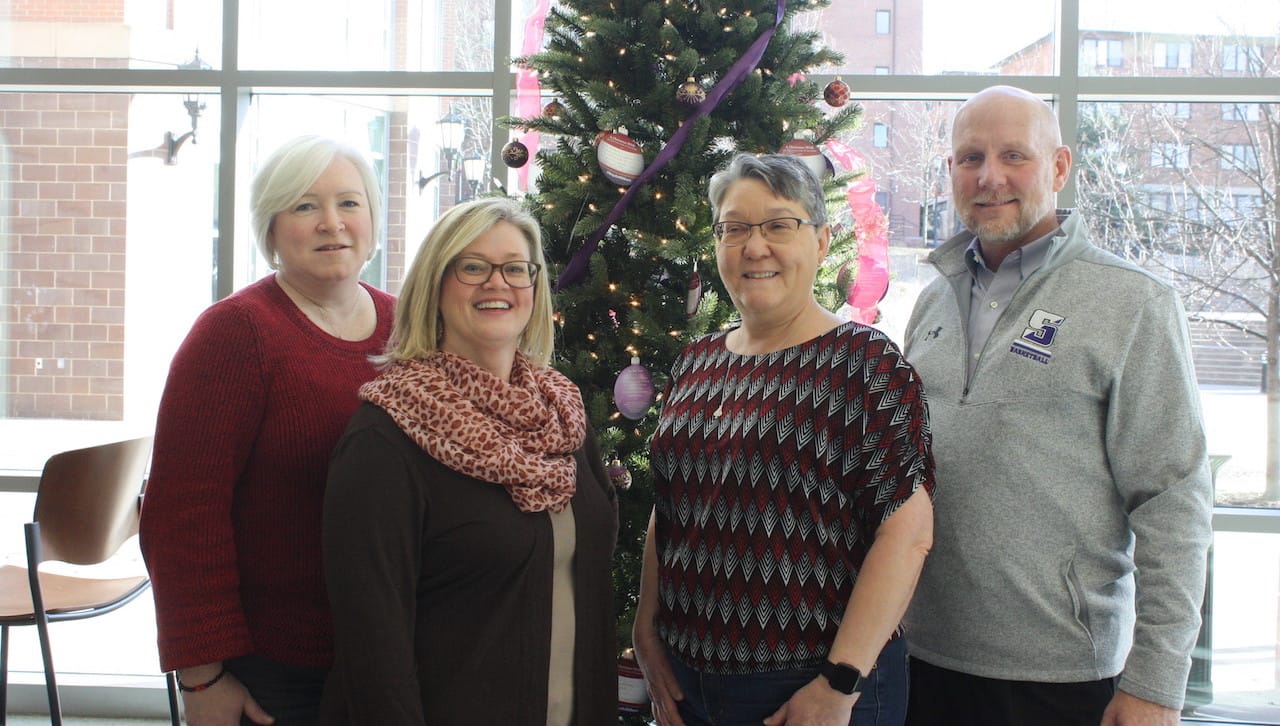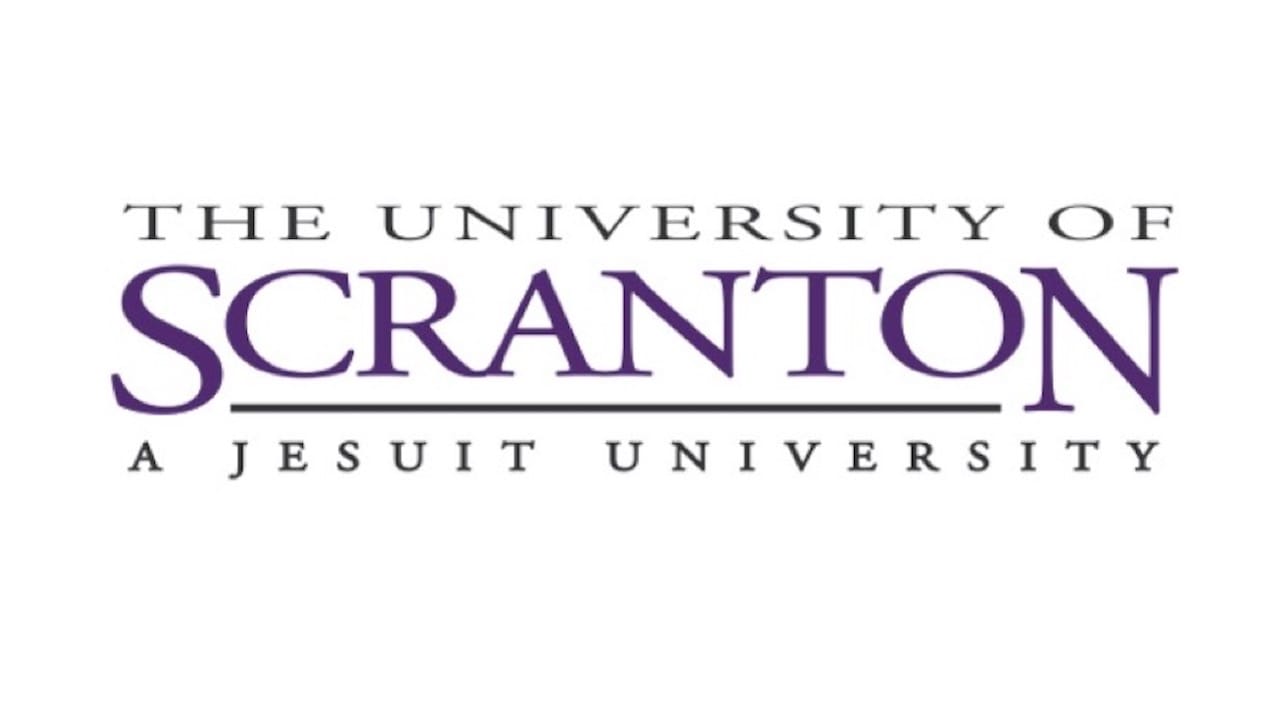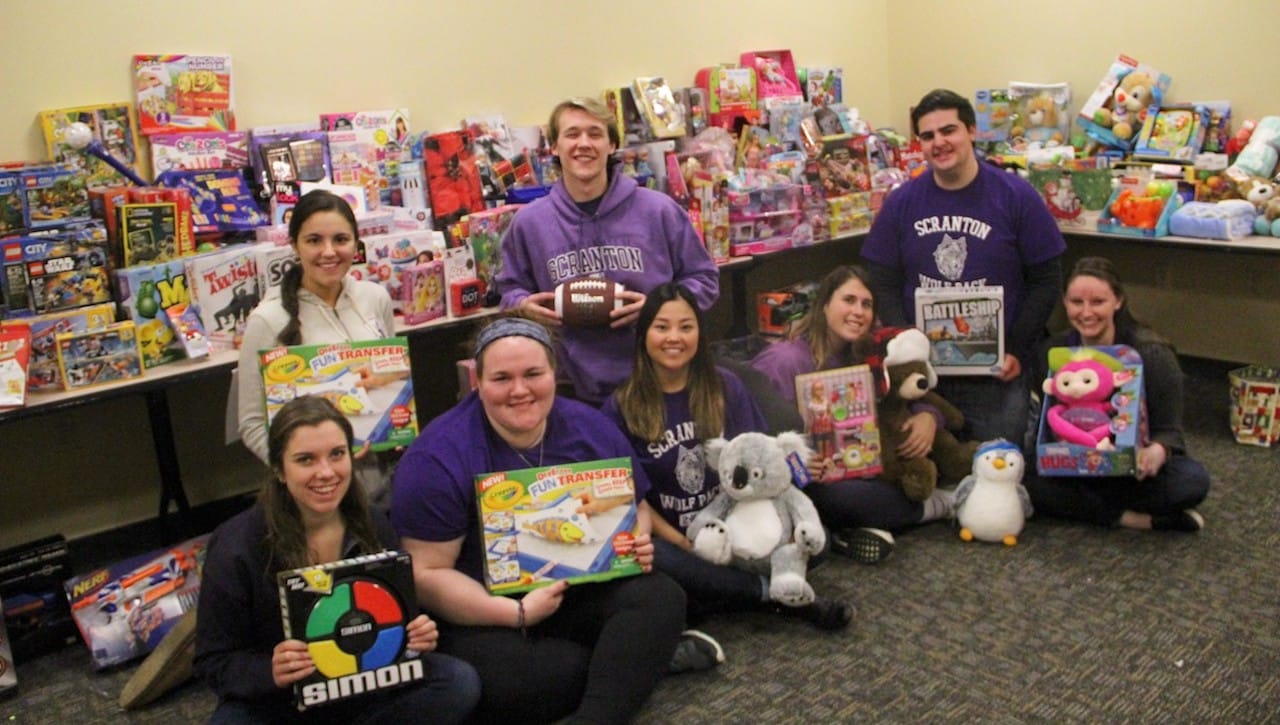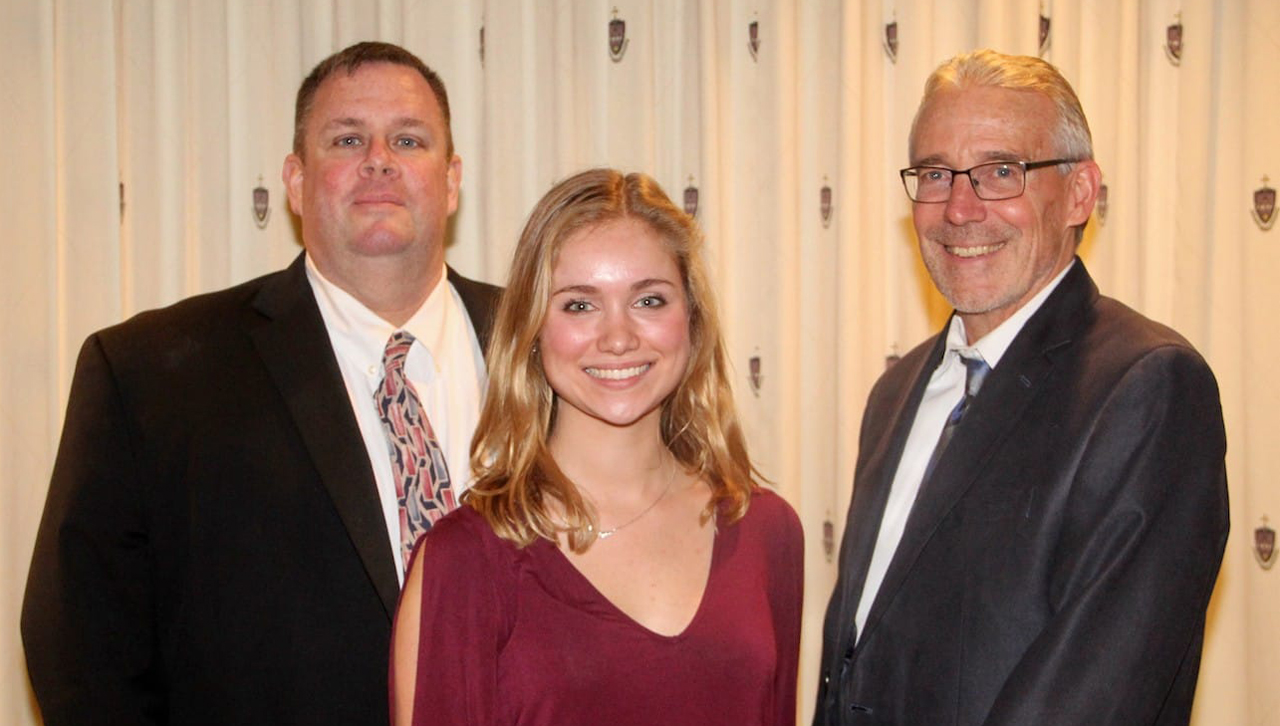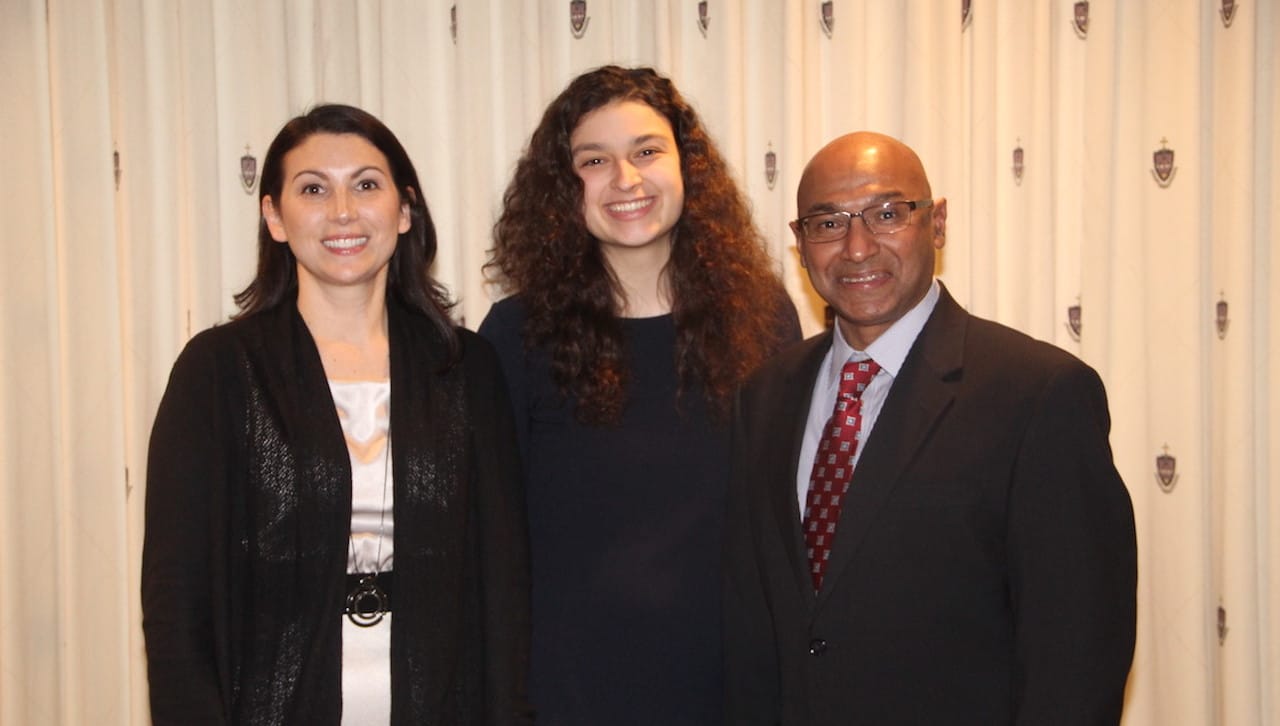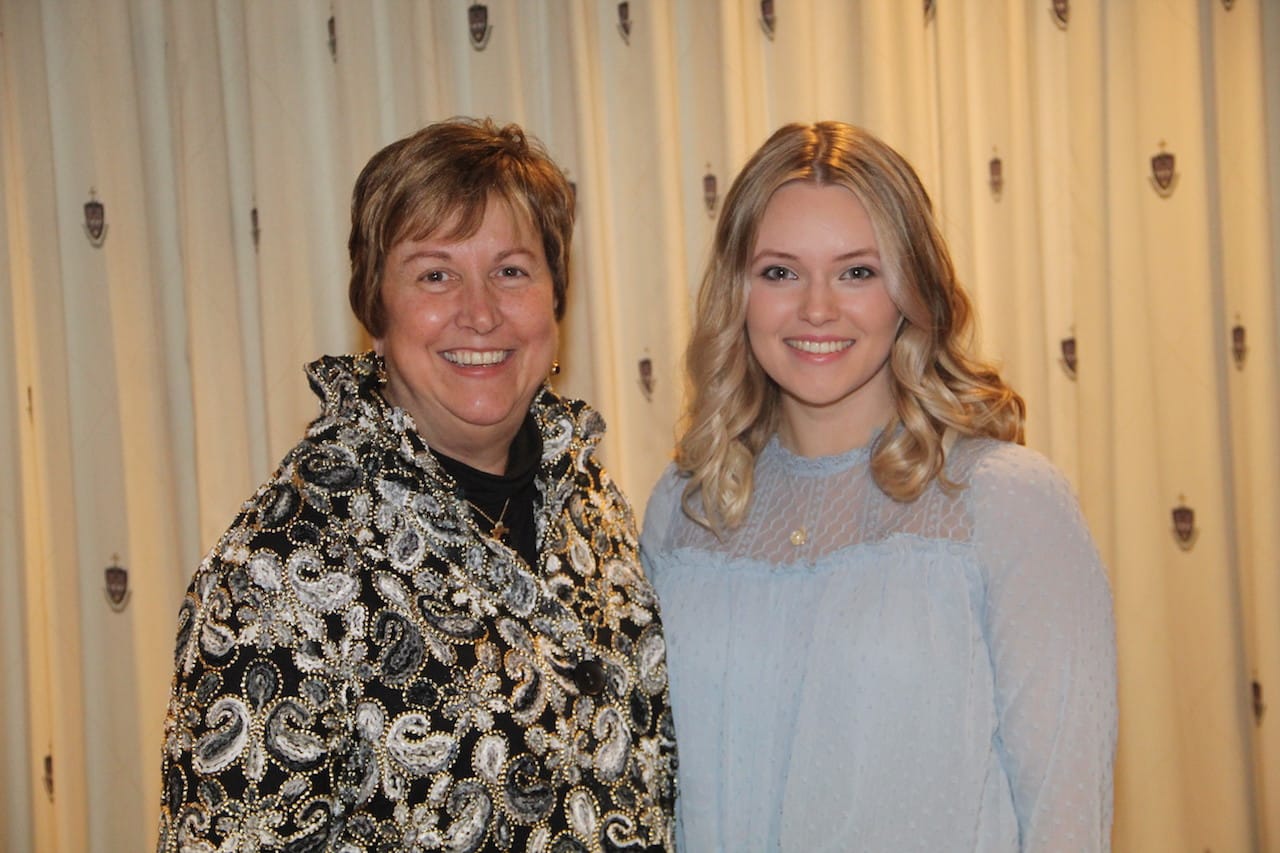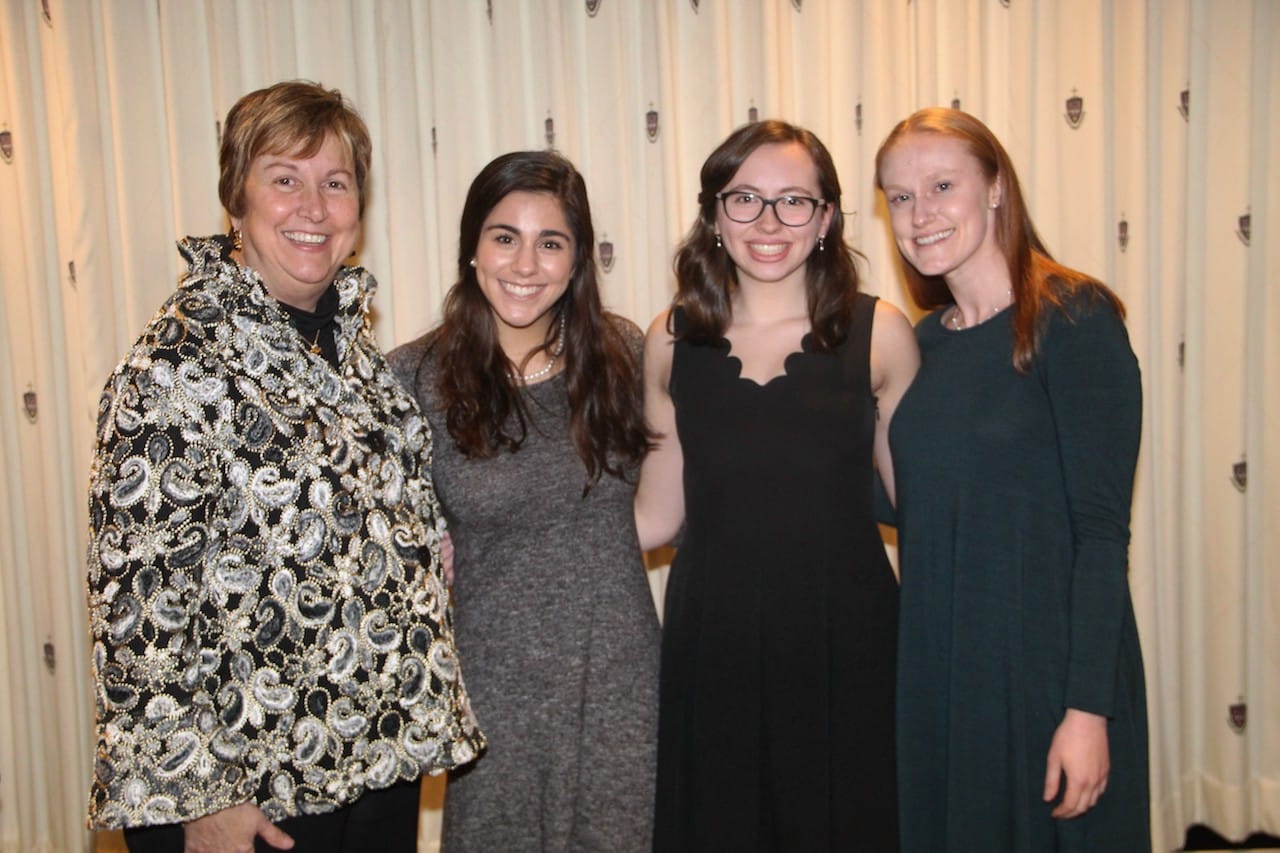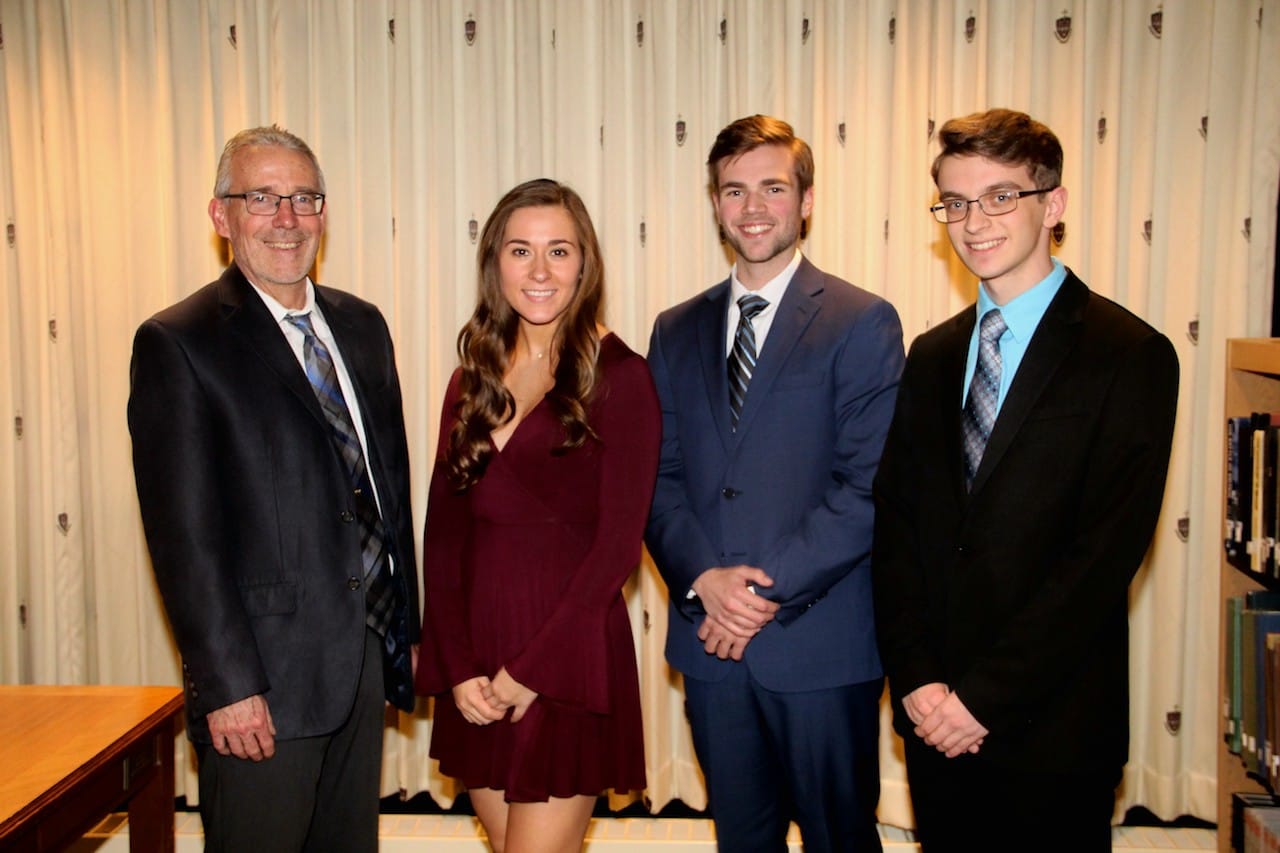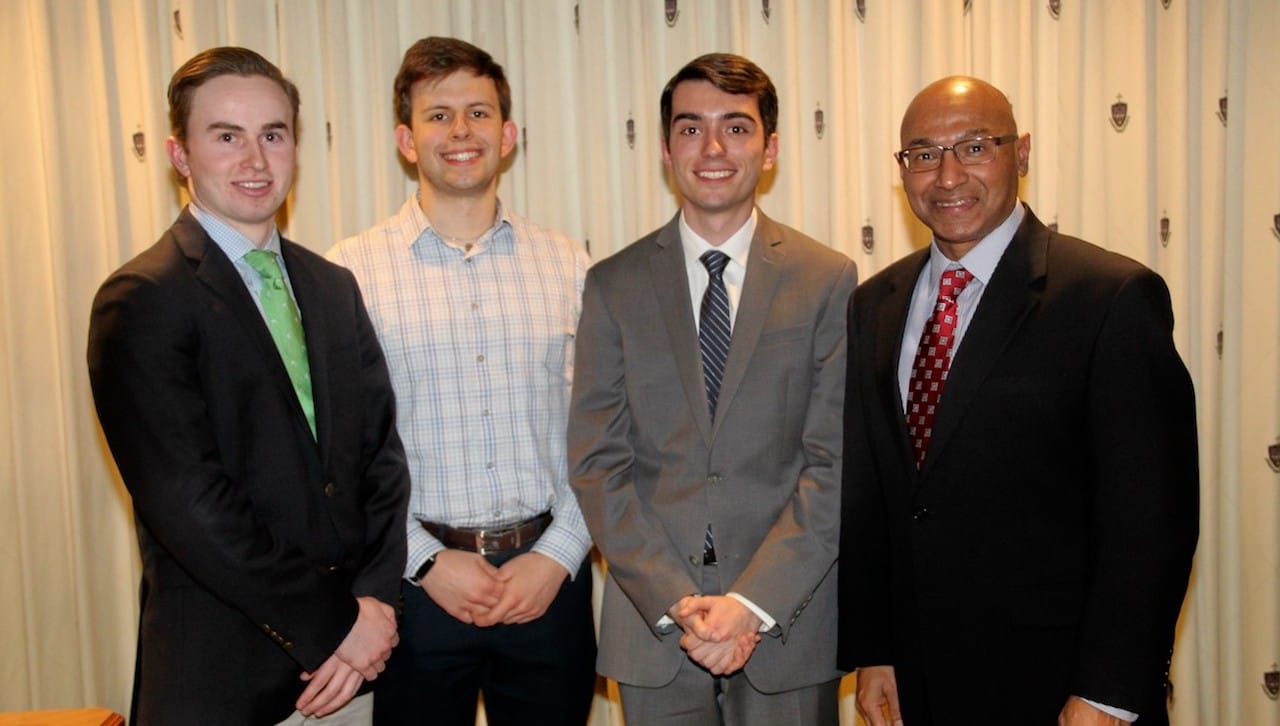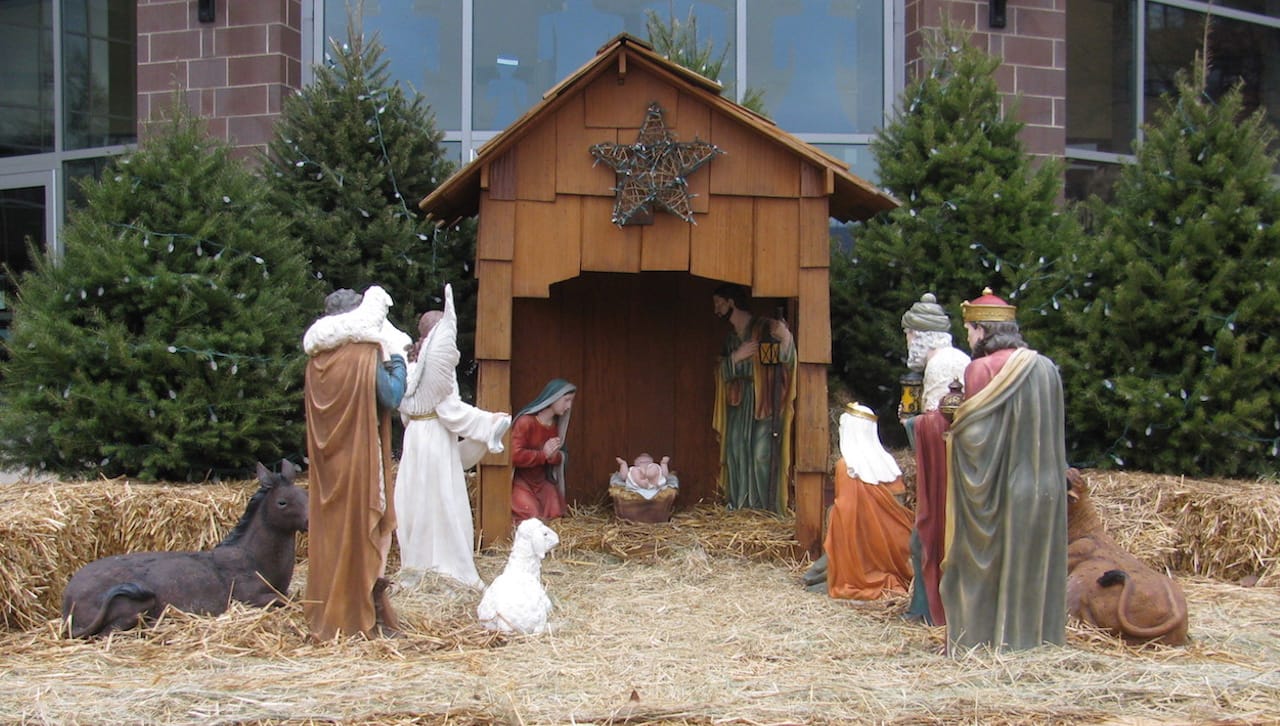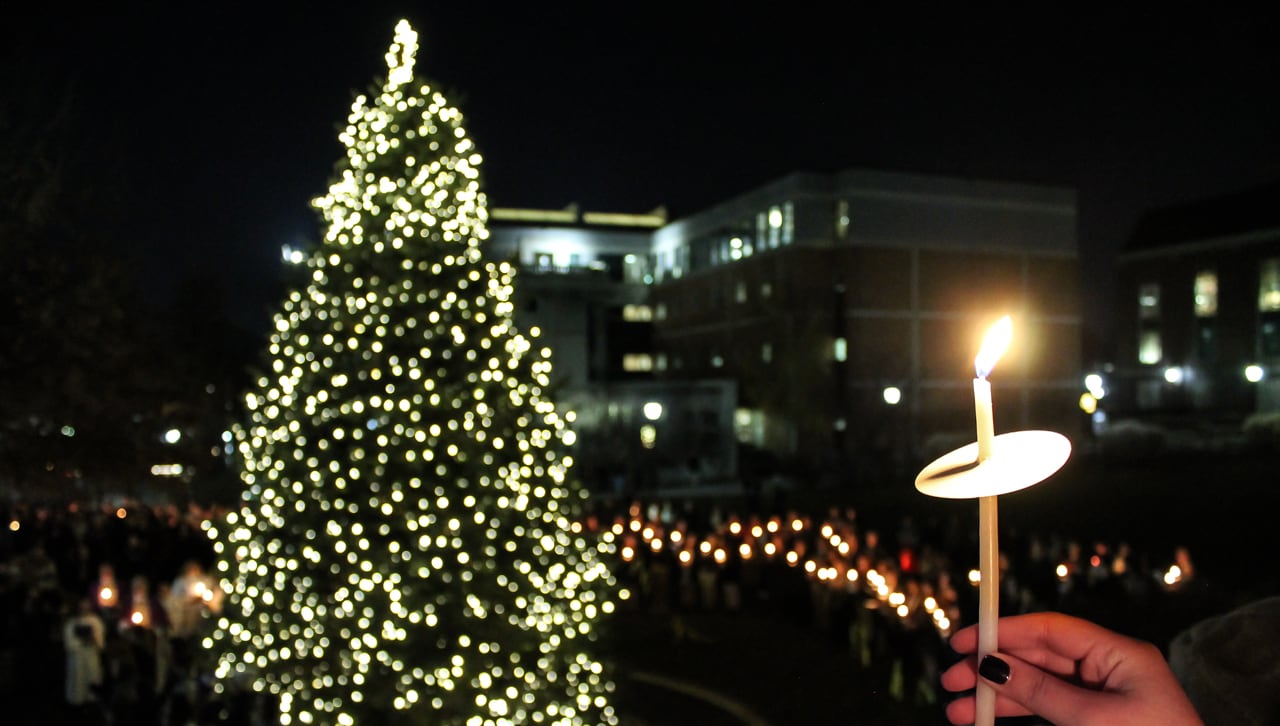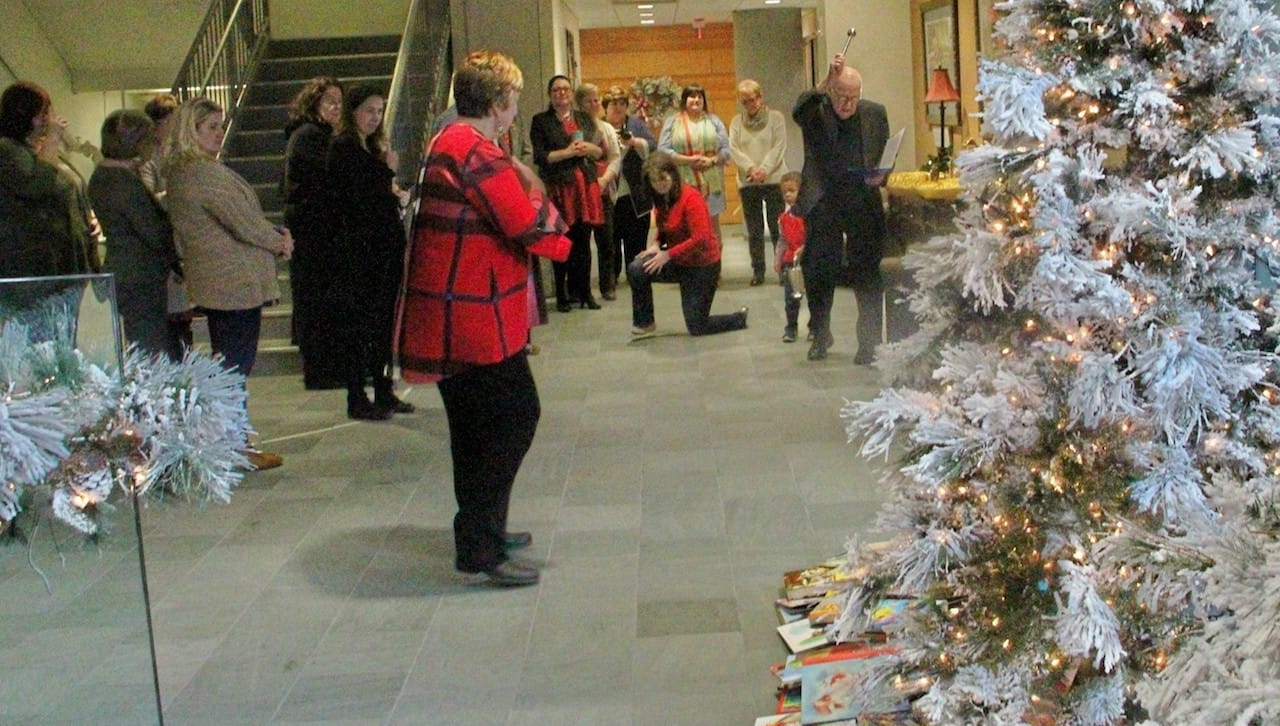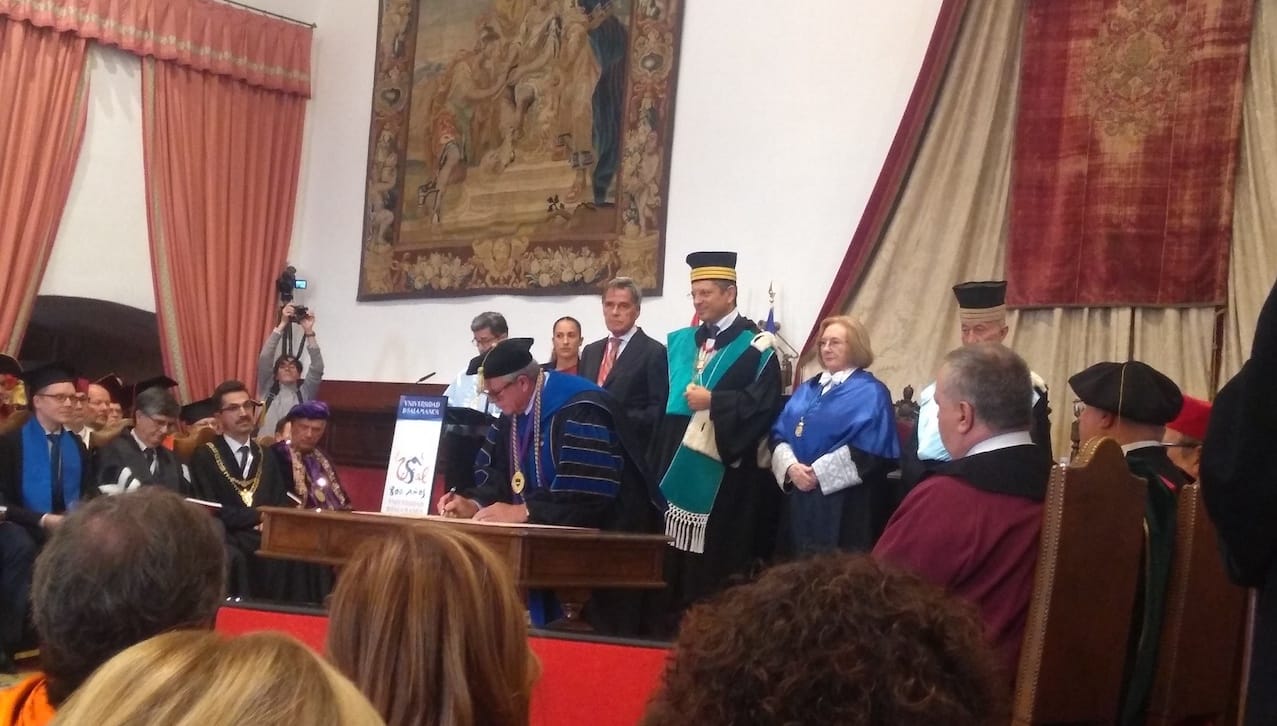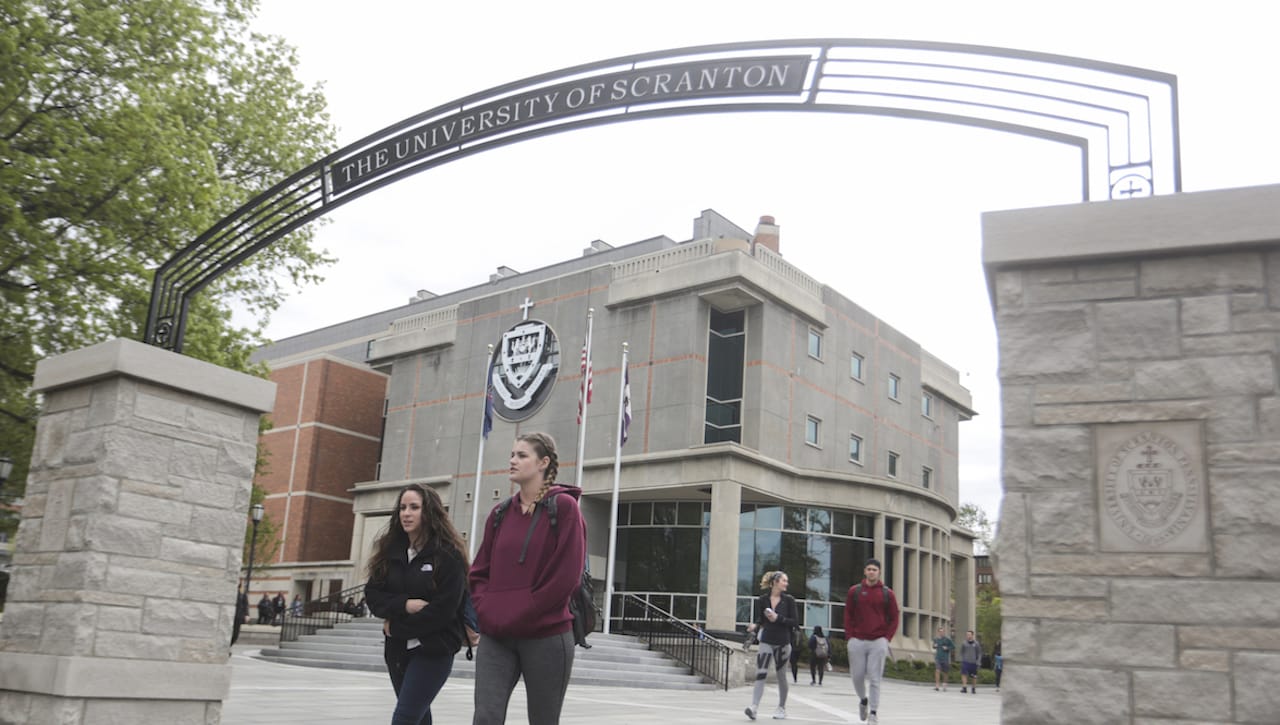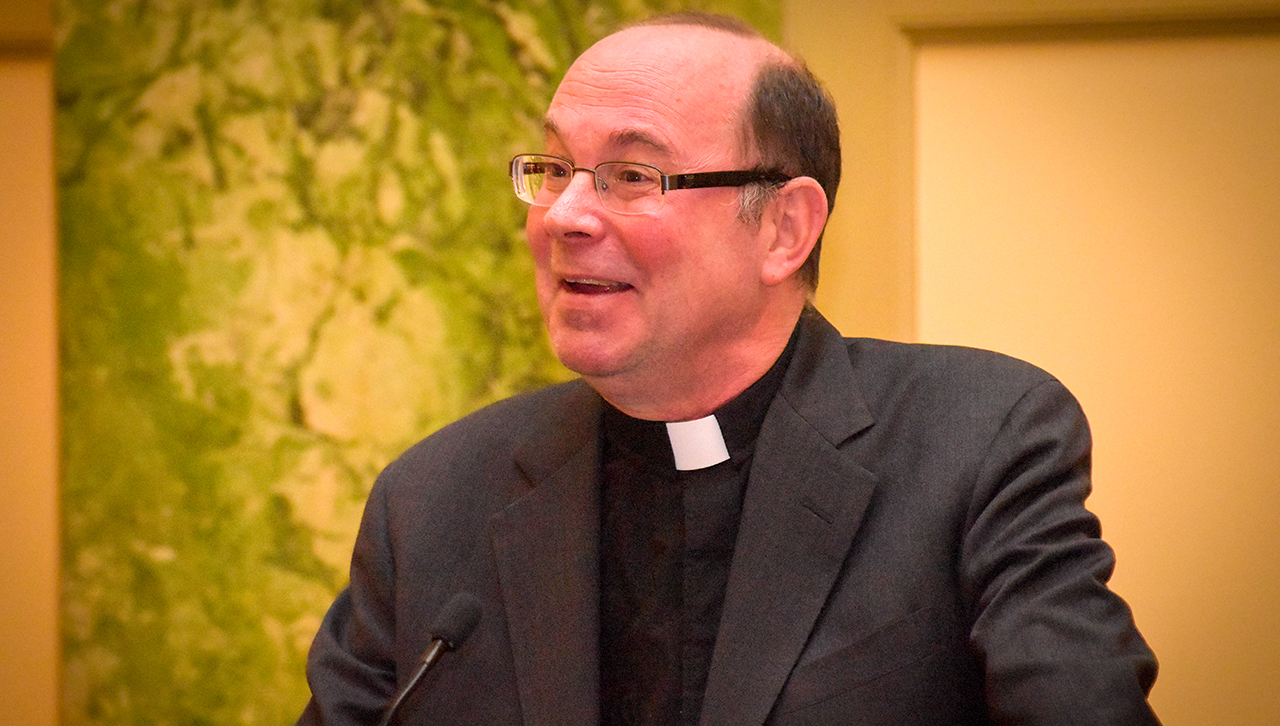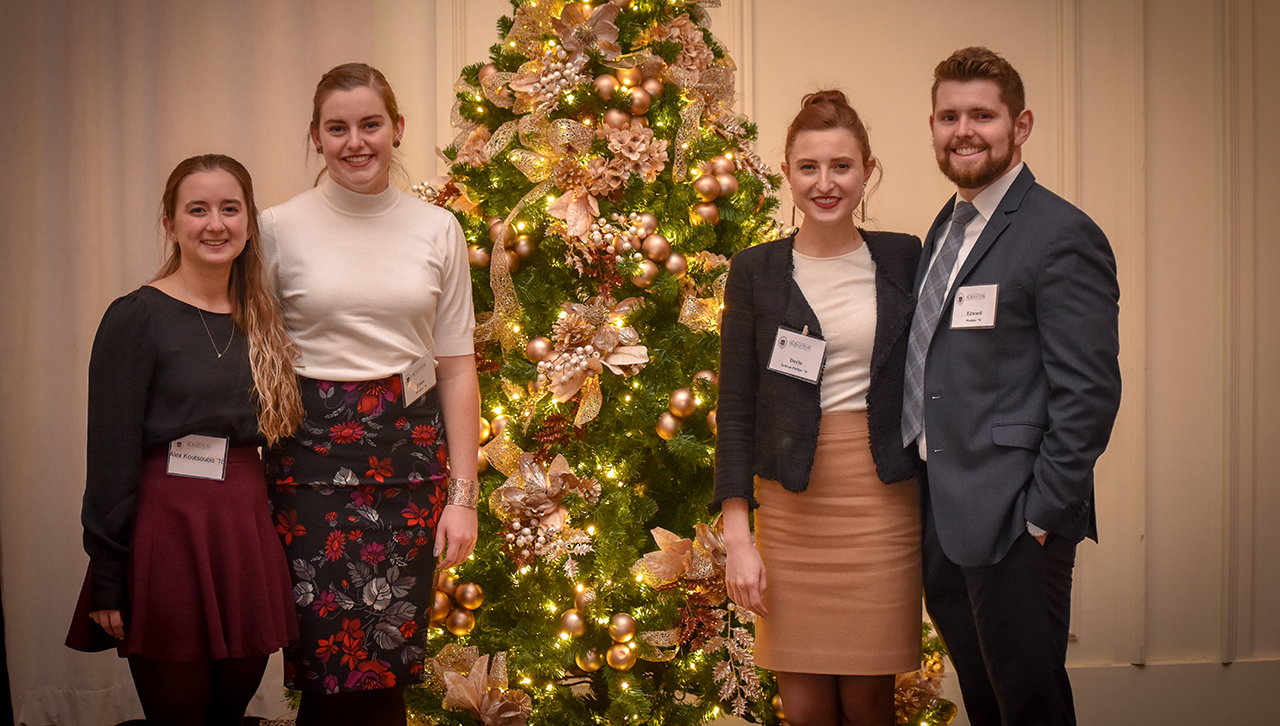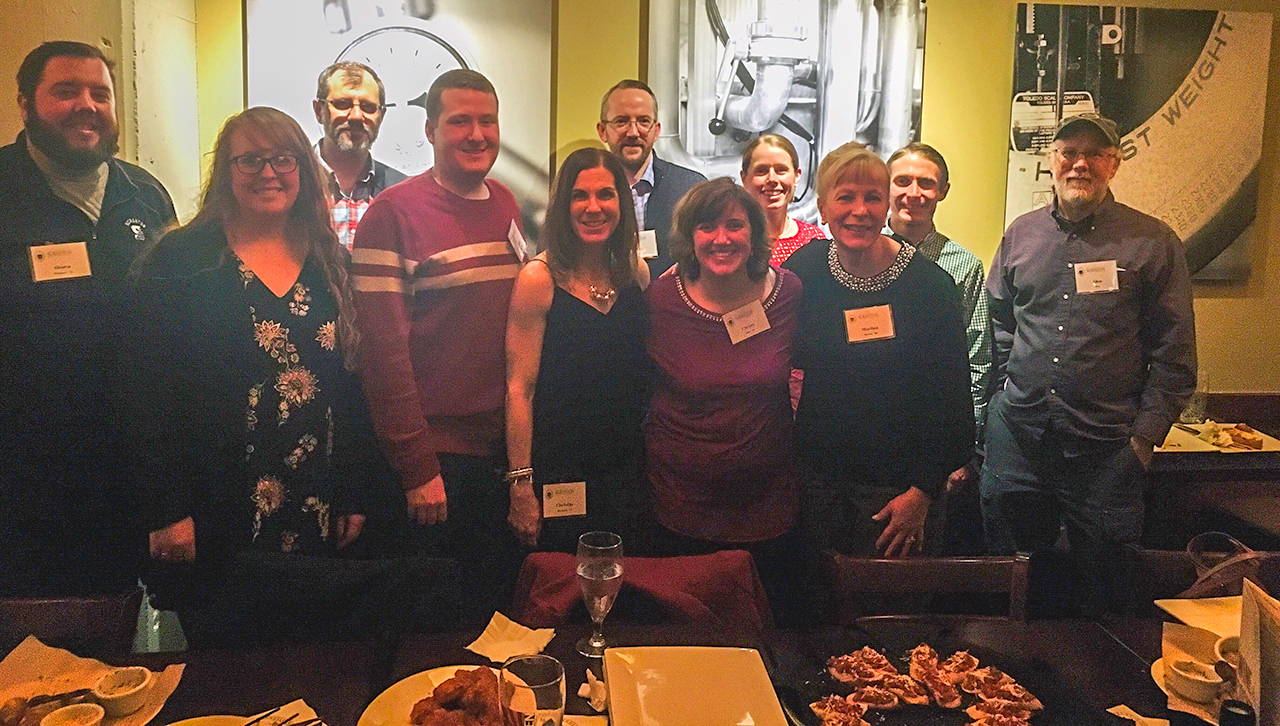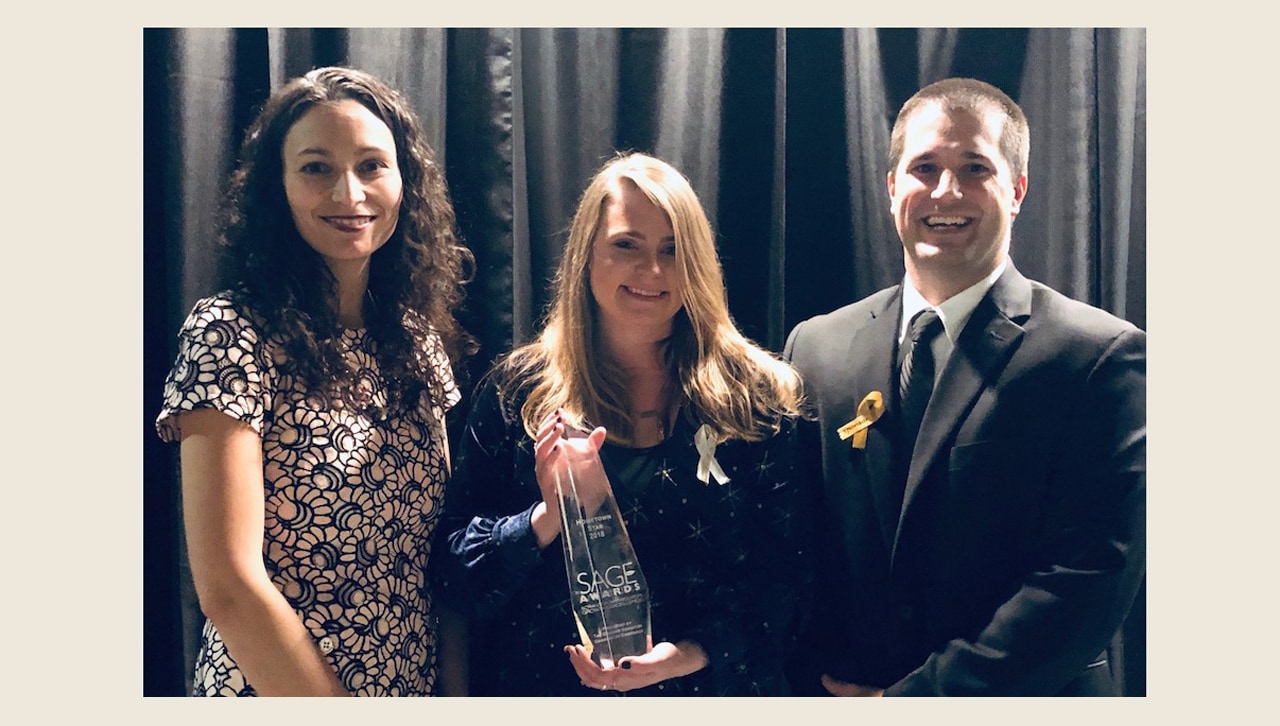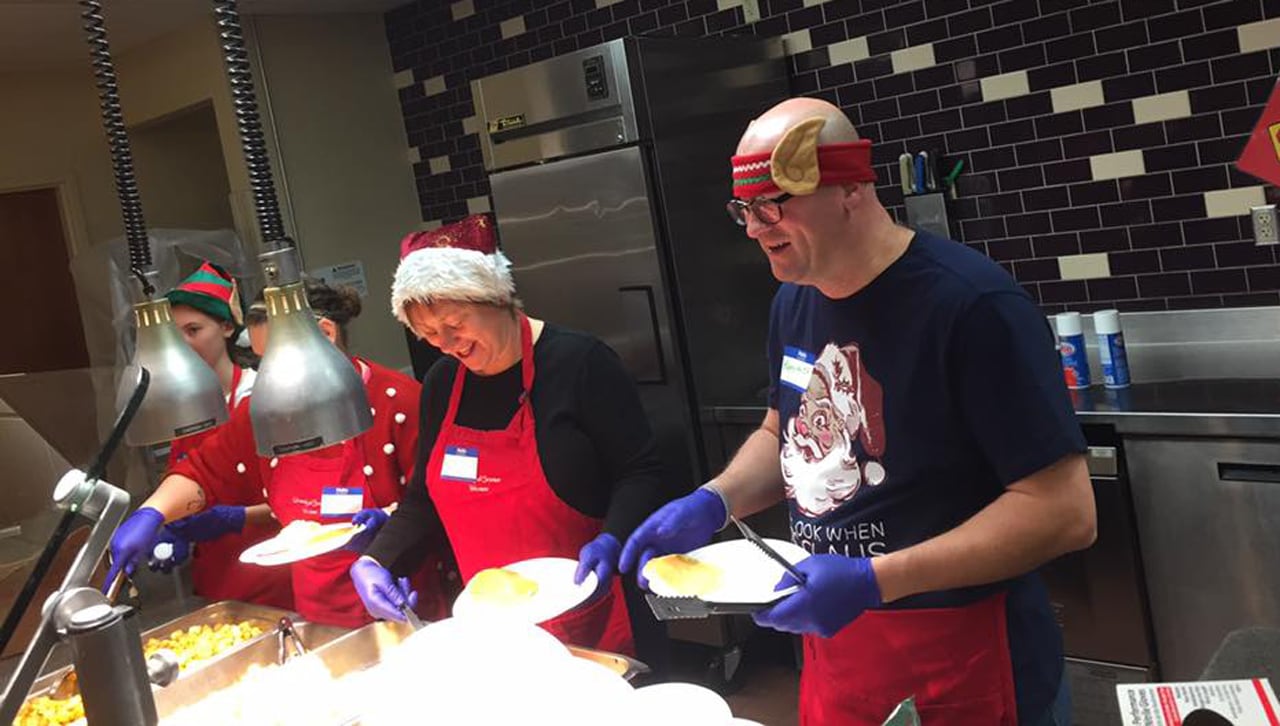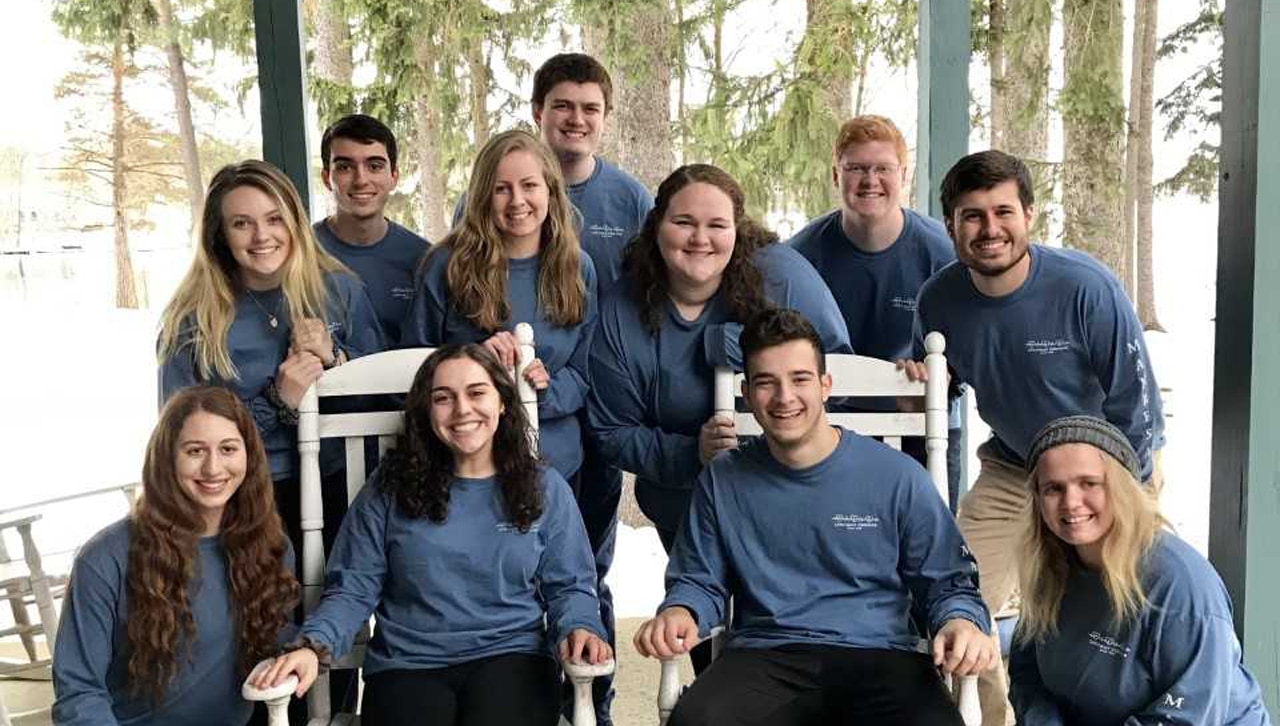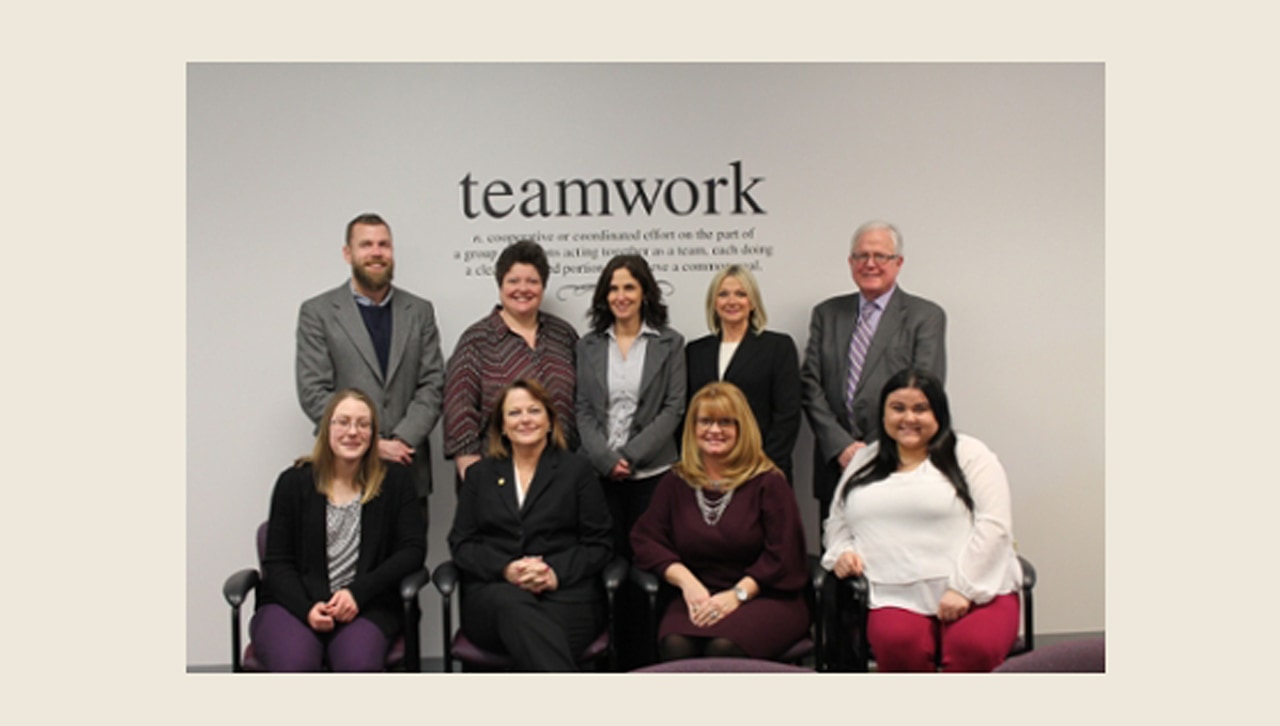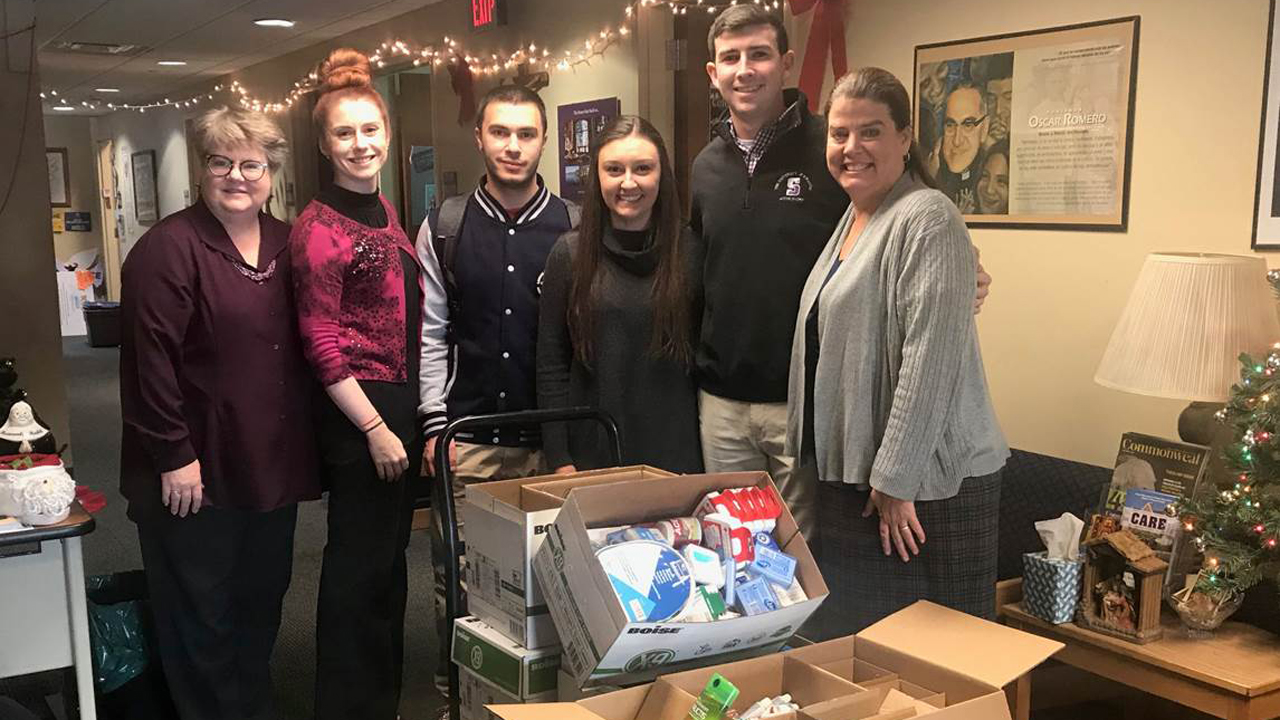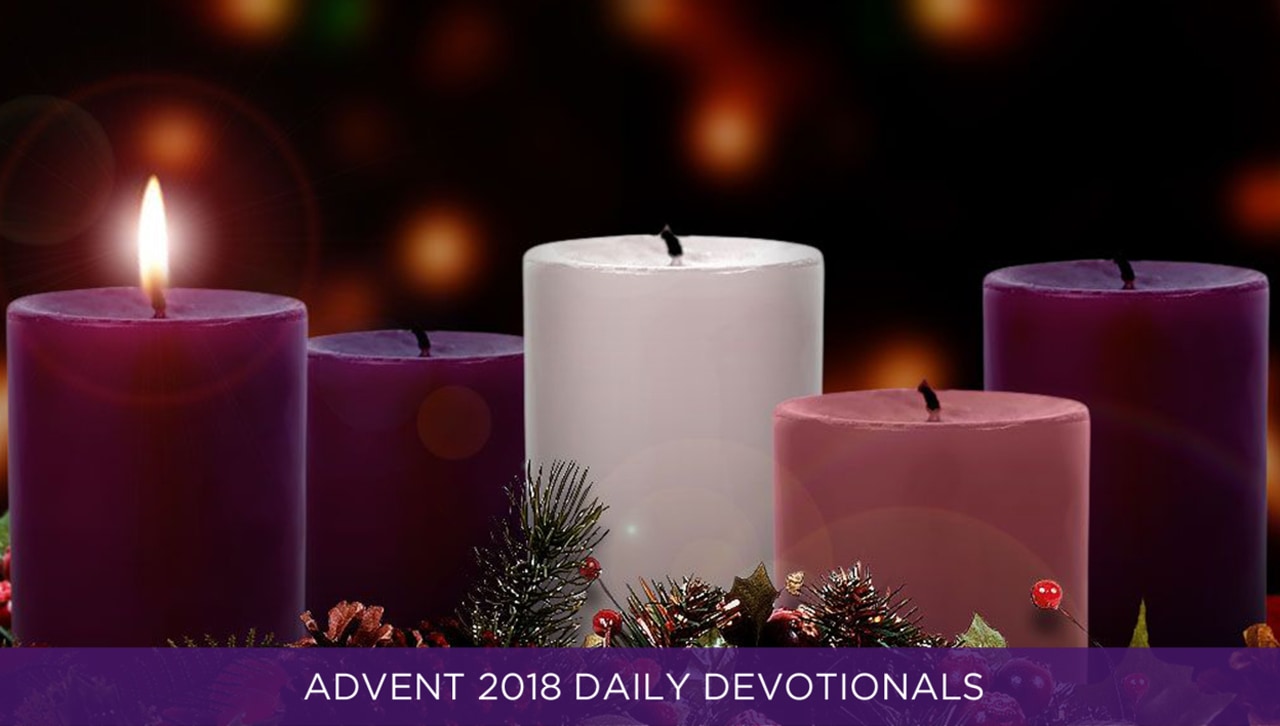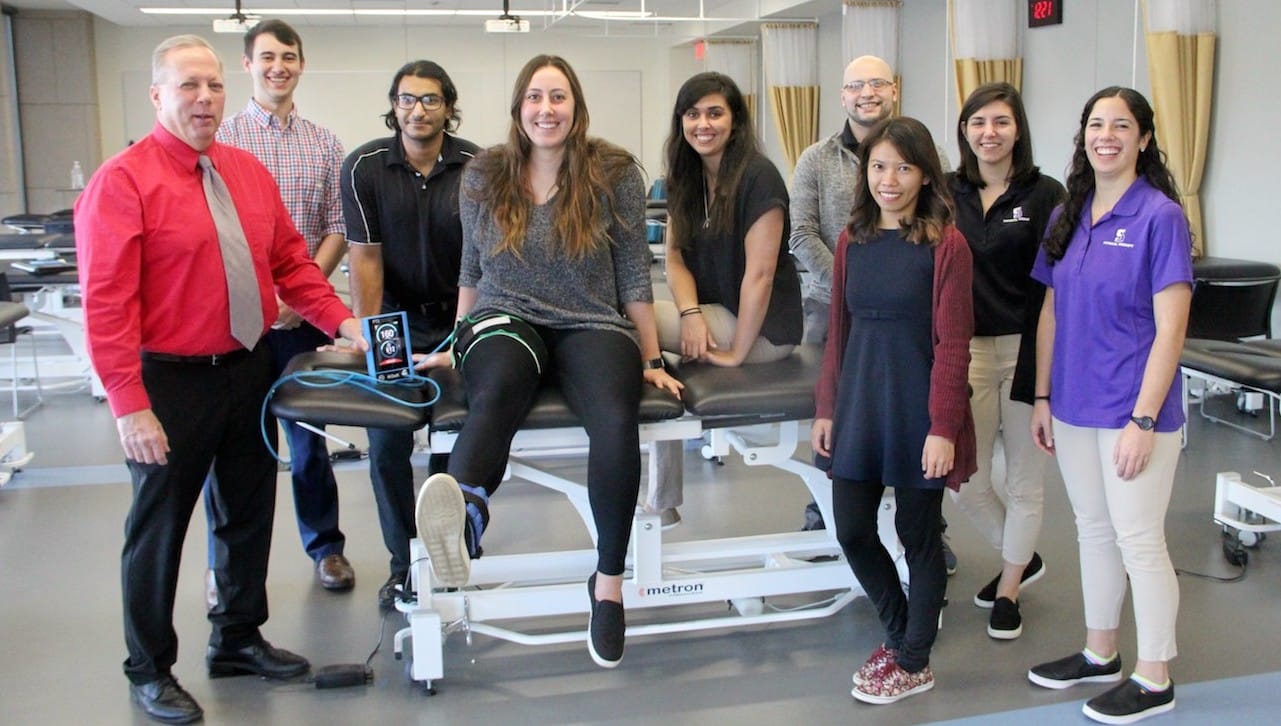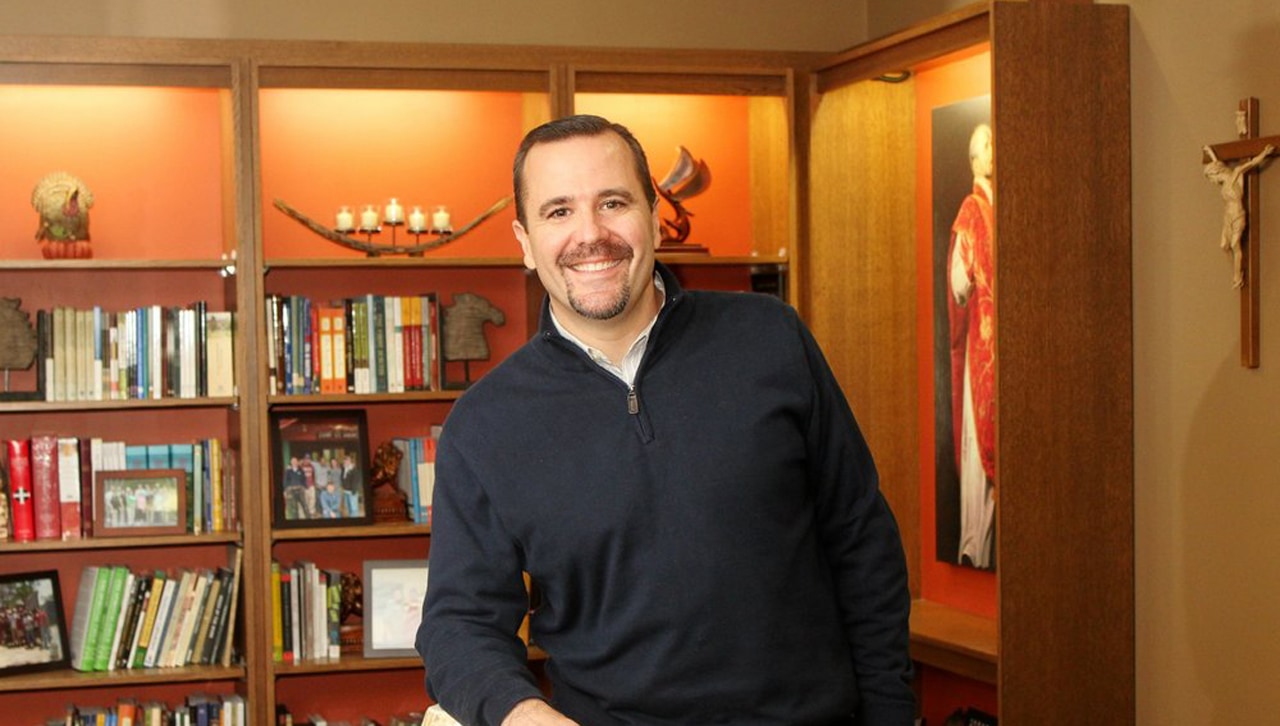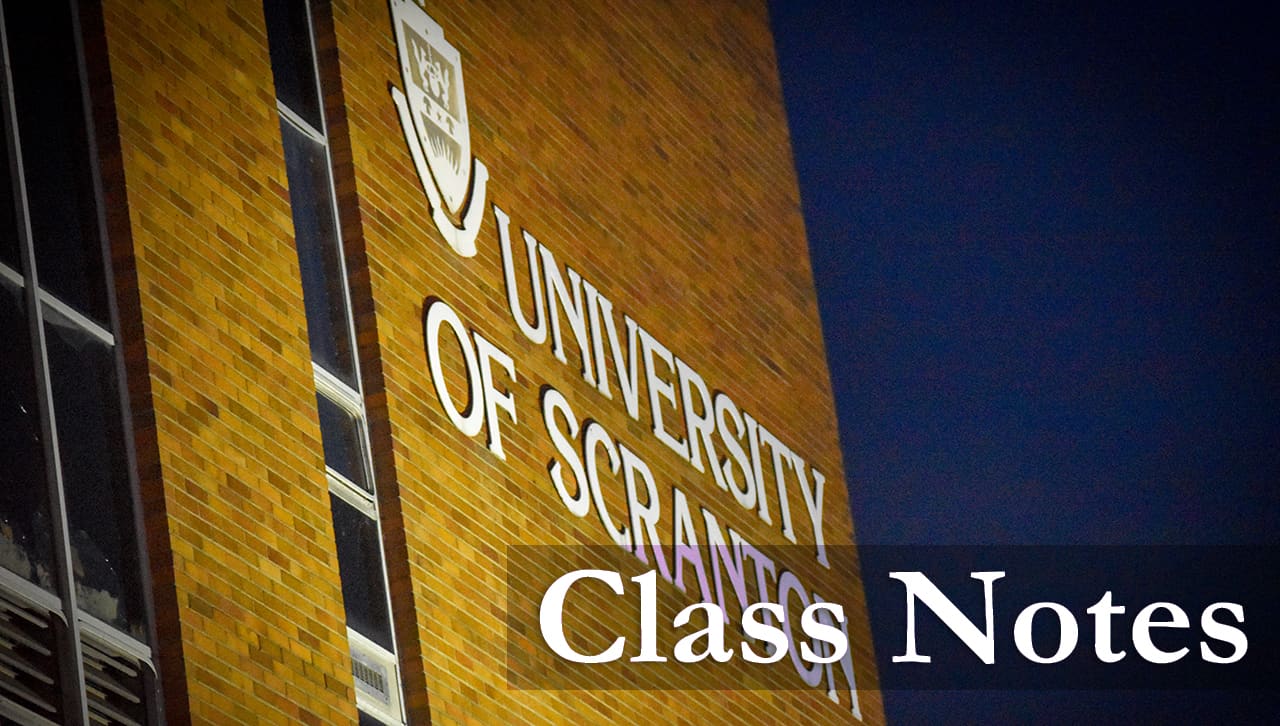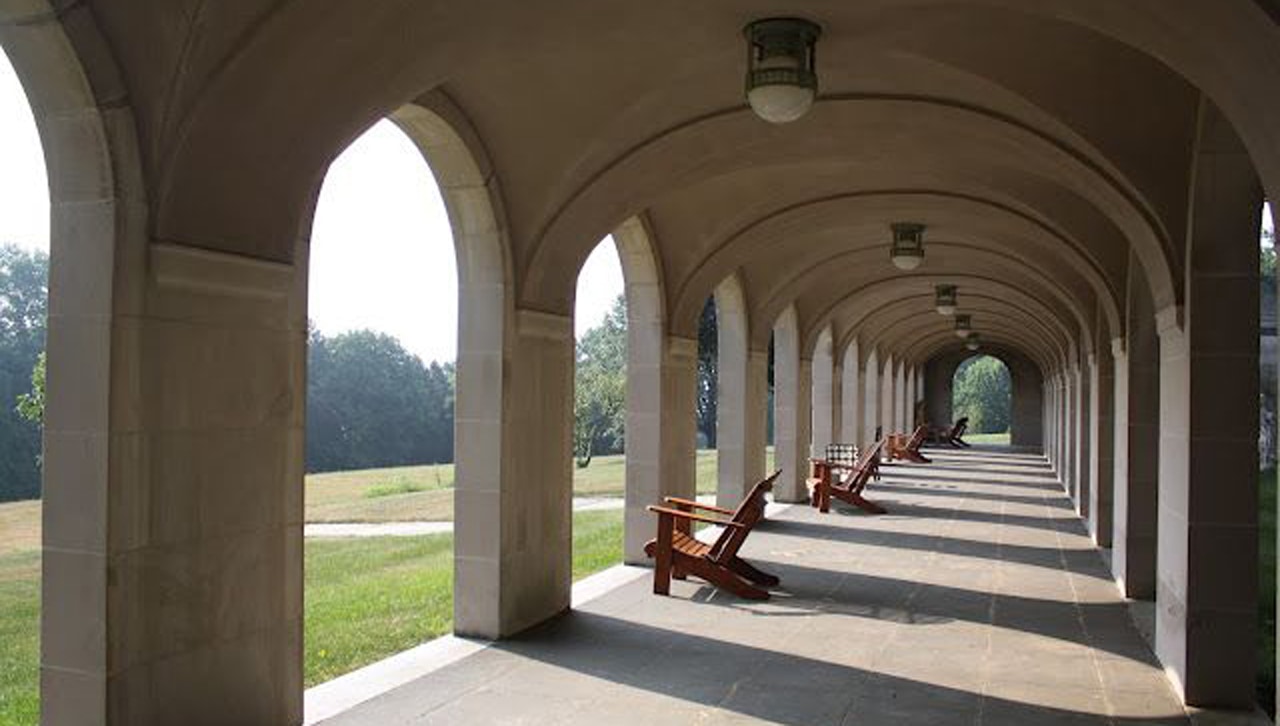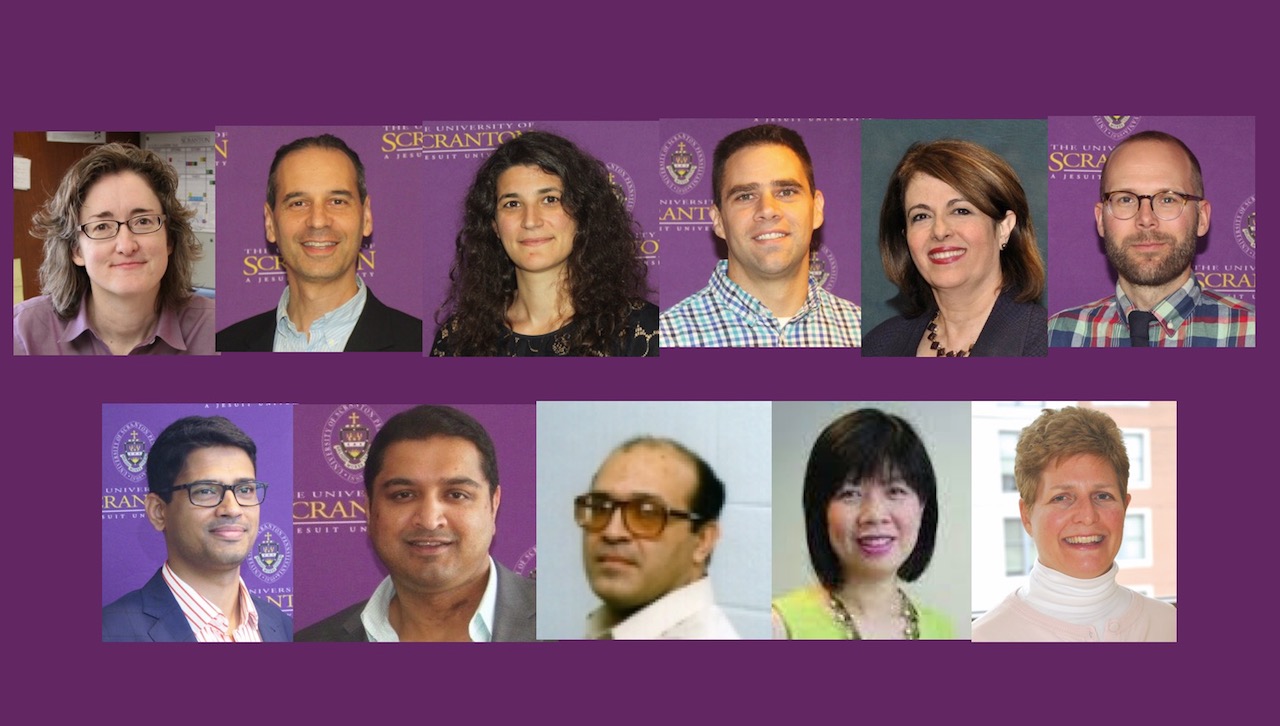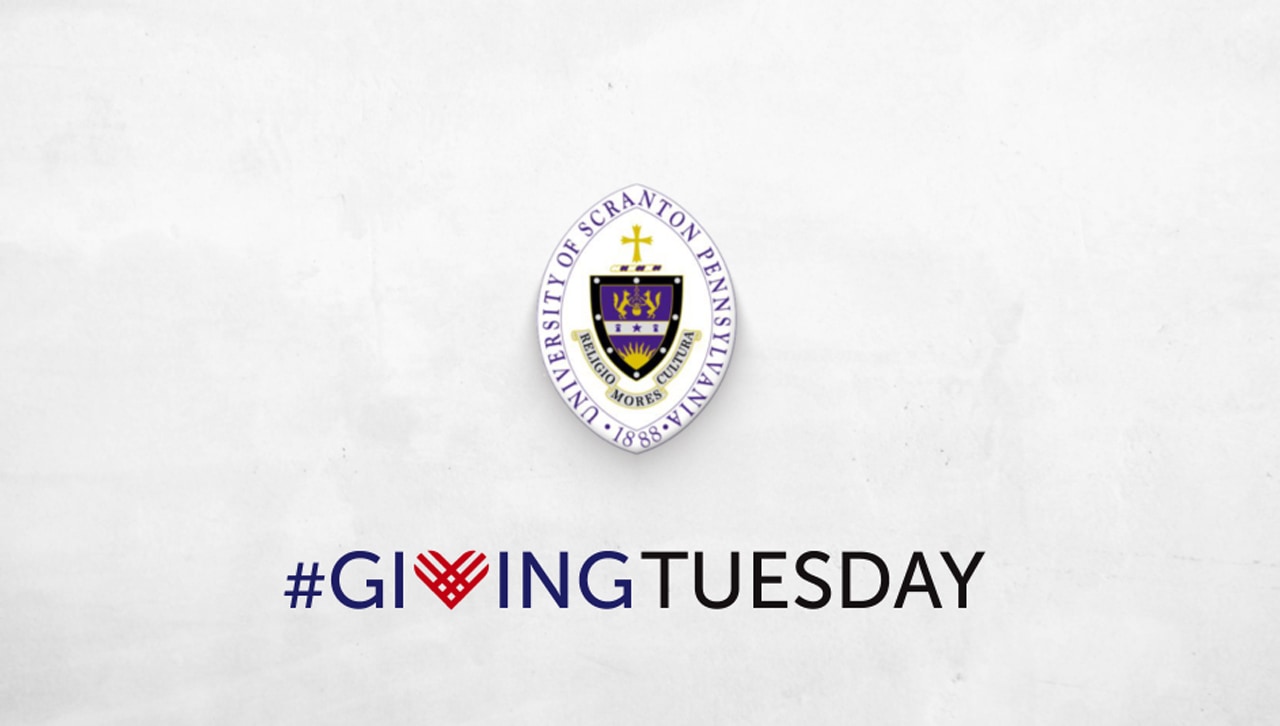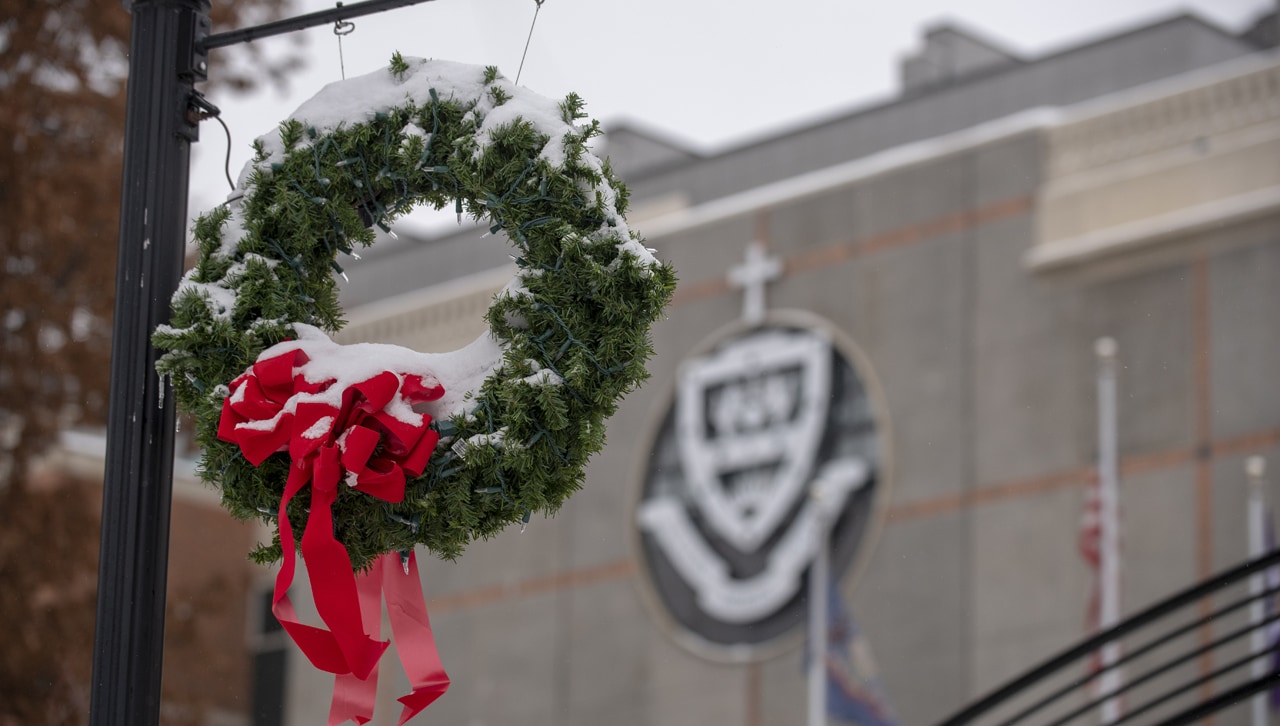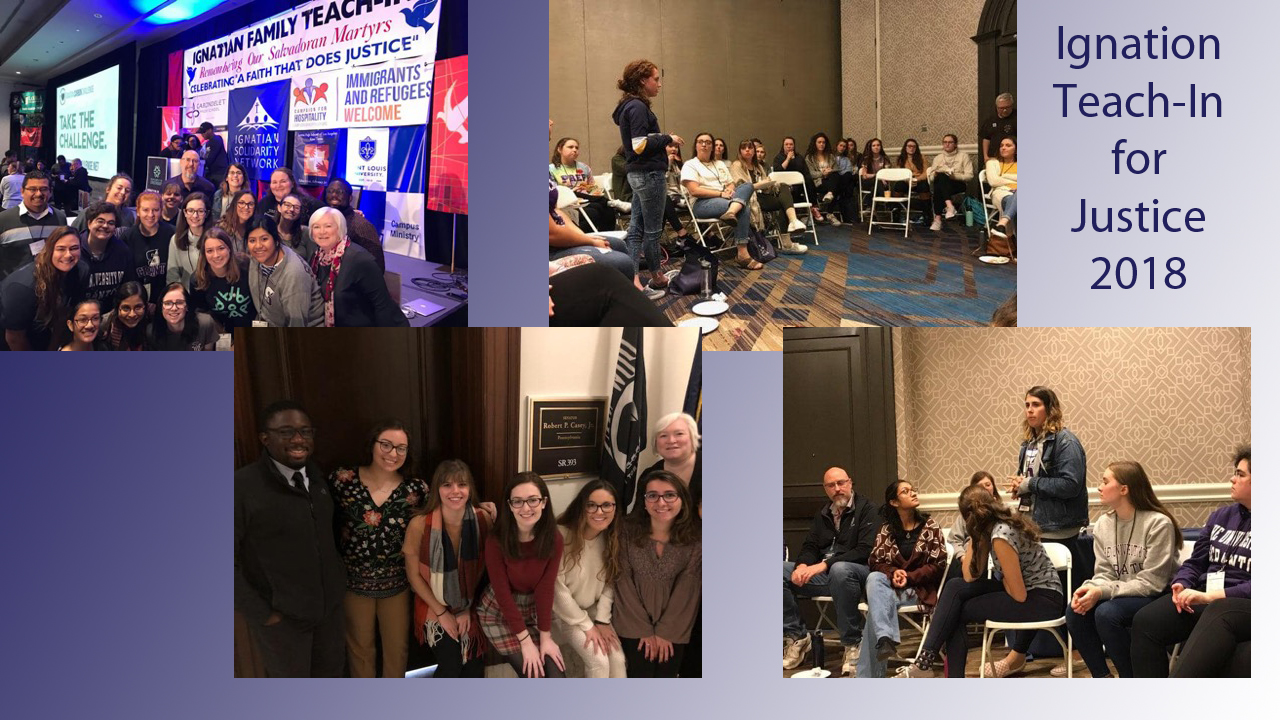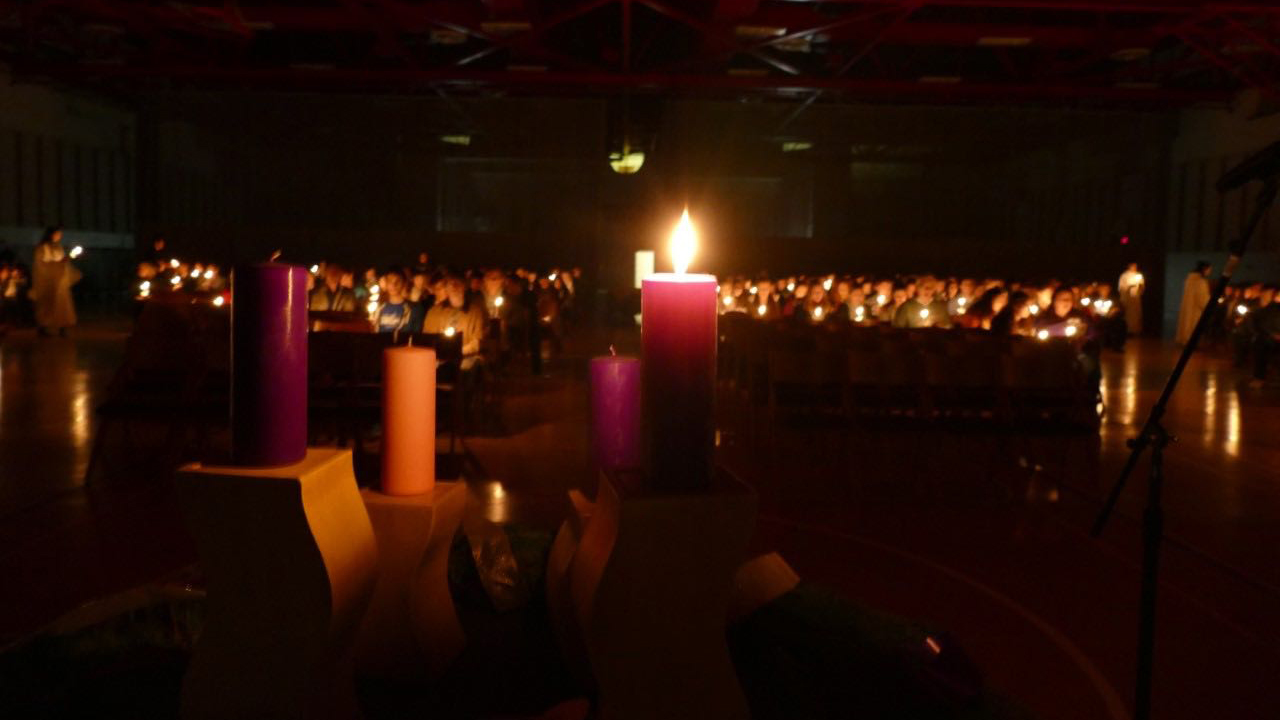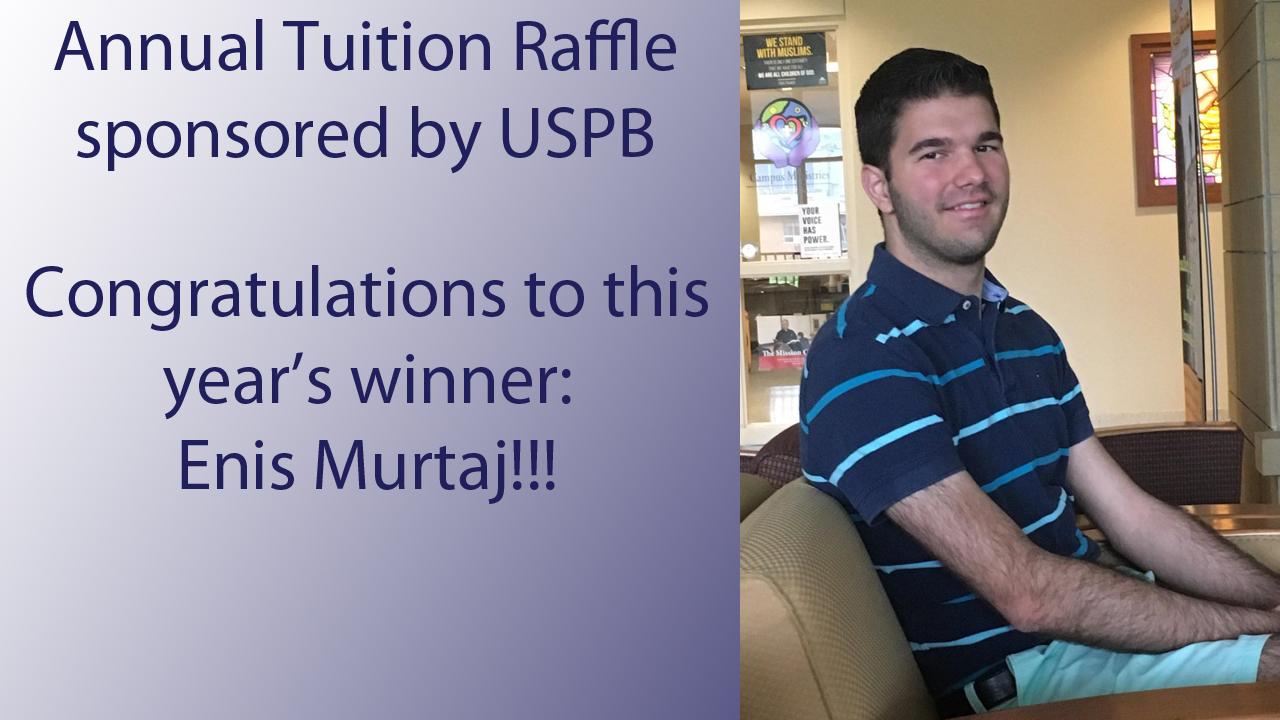The Advent Daily Devotional is a project of The Jesuit Center in partnership with University Advancement. It is made possible by the support of many University of Scranton colleagues, friends, families and alumni. Please consider showing your support by making a contribution using the link below.
Support Our Mission
Scripture readings are here.
December 2 Reflection
Today, the First Sunday of Advent, marks the beginning of the liturgical year. In the Catholic and mainline Protestant traditions, one of the main symbols used during the Advent Season is the Advent Wreath. These wreaths are often placed in prominent places in the church’s sanctuary so that all can see the colored candles and smell the fragrant evergreen boughs.
The Advent Wreath, with its humble origins as wagon wheels hung from ceilings when ancient roads were impassible, were used as chandeliers with increasing number of candles as the days grew short and the darkness increased. This circle of evergreens evokes the eternity of a God who has no beginning or end and the truth that Christ is the Light that conquers the darkness in which we walk. The candles may all be white with decorative ribbon: three of which are purple, one of which is rose or the candles themselves may be of those aforementioned colors. If you have the space, some place a white candle in the center, representing Christ.
As was the tradition in my home when I was a boy, many in our university community place Advent Wreaths in their homes- lighting the appropriate candles during the dinner hour each night. As the youngest of eleven children, it often fell to me to light the candles of the wreath as we said a special prayer and sang a verse from the ancient hymn O come, O come, Emmanuel. (To get a copy of an advent prayer service you can use in your own home, please click here).
May your home be blessed in a special way during this holy season of expectation. Let us continue to pray for each member of our families and for The University of Scranton family as well. May God’s infinite goodness bring each of you joy and peace this Advent Season.
Rev. Patrick Rogers, S.J.
Executive Director, The Jesuit Center
PRAYER
We pray, O Lord, for the courage to walk with you as Advent unfolds before us. May the scent of evergreen boughs remind us of your everlasting love and may the growing light of the Advent Wreath candles scatter the darkness in each human heart.
December 3 Reflection
Love has many forms. Friendship is one of the most important. So, today on the Feast of St. Francis Xavier—the most famous of all Jesuits—let us see how he related with his friends.
Writing from a remote isle in what is now Indonesia, he said:
So that I may never forget you and ever have a special remembrance of you, I would have you know, dearest brothers, that for my own consolation I have cut your names from the letters which you have written to me with your own hands so that I may constantly carry them with me together with the vow of profession which I made because of the consolations which I receive from them. I give thanks first of all to God our Lord, and then to you, most dear Brothers and Fathers, for the fact that God has so made you that I derive such great consolation from bearing your names.
And a footnote adds:
When Xavier died he had a locket suspended from his neck which contained a small relic of St. Thomas, the formula of his vows, and a signature of Ignatius which he had cut from a letter.
(Costelloe, Letters of Francis Xavier, 141-42)
May we fruitfully remember and help our friends, most of whom are so much nearer.
James D. Redington, S.J.
Jesuit Fellow, The Jesuit Center
PRAYER
Lord Jesus Christ,
we humbly pray on this feast of Saint Francis that all be gathered together at the great banquet in your Father's Kingdom, the Kingdom prepared from the foundation of the world.
December 4 Reflection
On this day we remember the life of St. John Damascene. John was an astonishing person having spent most of his life living in Muslim majority places but living near Jerusalem. He was a writer and a poet who used his talents to pay homage to the Blessed Mother. We can all look to the life of St. John Damascene during this Advent season to remind us of the Blessed Mother and her beautiful gift of a child that she shared with the world on December 25.
Sharing one’s child with others can be very difficult. In fact, my personal journey involves being the recipient of a mother sharing her child with me. My husband and I adopted our children years ago from two loving birth mothers. Giving your children to others is the ultimate sacrifice, yet the most loving one in the case of adoption. Thus, I regularly pray to the Blessed Mother to remind myself of her ultimate sacrifice in giving her Son to save all of us. I try and say a decade of the rosary on a daily basis in thanks for the gift from other mothers to me. I see the rosary as the beads of life all connected together with the love of the Blessed Mother.
In closing, I leave you with a very special poem and prayer. Reading it always reminds me of the innocence of a child. Enjoy, and have a blessed Advent season.
Catherine Lovecchio, Ph.D.
Department Chair, Nursing
PRAYER
"Heartprints"
Whatever our hands touch…
We leave fingerprints.
On walls, on furniture,
On door knobs, dishes and books.
Smudges, showing we were there! Oh Lord, please,
Wherever I go today…
Help me leave Heartprints…
Heartprints of compassion,
Understanding and love.
Heartprints of kindness
And genuine concern. I shall go out today…
To leave Heartprints…
And if some one should say…
“I felt your touch!”
May that one feeling be…
Your loving touch, Lord,
Through me!
May my heart touch
my lonely neighbor, with a smile,
a worried mother, with peace,
a runaway child, with safety,
a homeless person, with warmth,
and my dear friends, with love.
December 5 Reflection
In today’s gospel reading, Jesus fulfills a prophecy from Isaiah by ascending a mountain. “Great crowds came to him, having with them the lame, the blind, the deformed, the mute, and many others. They placed them at his feet, and he cured them.” It doesn’t say how Jesus cured them or what He said, if anything, but it does mention that “the crowds were amazed,” and that they glorified God. Jesus does reveal what he was feeling, however: “my heart is moved with pity for the crowd,” he says to his disciples, “for they have been with me now for three days and have nothing to eat. I do not want to send them away hungry.” Jesus then blesses the scant bread and fish they had with them so that it fed everyone with baskets to spare.
It wasn’t enough that Jesus cured the people; he had to make sure they were also fed. I hear echoes of my grandmother: “sit down, you’re not going anywhere until you’ve eaten something.” Preparing food for another and eating together with them fosters intimacy. Jesus wants that intimacy with the people gathered there on the mountain. It wasn’t enough for Him to “fix their problems.” He wanted to prepare and share a meal with them, to bond with them, to befriend them.
The prophecy from Isaiah speaks of the Lord on a mountain providing for all peoples “a feast of rich food and choice wines.” Then comes the healing: “on this mountain He will destroy the veil that veils all people, the web that is woven over all nations; He will destroy death forever. The Lord God will wipe away the tears from all faces…” What a beautiful, moving image! One can’t help but wonder if Jesus wiped away anyone’s tears as He healed them that day in Galilee.
Jesus gave the people bread and fish that day on that mountain, but very soon He would also give them His life: His very flesh and blood, sacrificed on the cross. It is through this sacrifice that the God of life destroys death once and for all. And so in receiving Jesus’ body and blood at the sacrifice of the Mass, we are also fulfilling that prophecy from Isaiah by sharing in the feast that saves us from death. As Jesus tells us, “anyone who eats my body and drinks my blood has eternal life, and I will raise that person on the last day” (Jn 6:54).
Patrick Clark
Associate Professor, Theology & Religious Studies
PRAYER
Lord Jesus, you are the Good Shepherd who became the Lamb of God, born as a child in Bethlehem. Lead us to Your holy mountain, to verdant pastures and restful waters. Gather us around the table you have prepared for us, where we might feast on You, Who are the fulfillment of all good things. And grant that we might dwell in Your presence all the days of our life, and be raised up with You on the last day. Amen.
December 6 Reflection
The true story of Santa Claus begins with St. Nicholas, and on this sixth day of December, we celebrate the Feast of St. Nicholas. While many of us visualize a fantastical Santa, it’s comforting to recall that the real St. Nicholas, who was born to wealthy parents in the third century, obeyed Jesus’ words to “sell what you own and give the money to the poor." St. Nicholas used his entire inheritance to help the needy, sick, and suffering. He dedicated his life to serving God and was known for his generosity to those in need and his love for children. In his true form, St. Nicholas points us to God’s most special gift; the sending of a Savior for the most ordinary of people.
As we walk this Advent journey, let us pray that we act as St. Nicholas did and remember the words of Jesus; to give all that we can to the poor, needy, and sick. May we live our faith and share our love, compassion, and abundance during Advent, and carry it with us throughout the entire year.
"The giver of every good and perfect gift has called upon us to mimic Gods giving, by grace, through faith, and this is not of ourselves."
- St. Nicholas of Myra
Tara M. Seely
Administrative Assistant to the Board of Trustees
PRAYER
Gracious God, open our hearts to be like the poor children who were cared for by St. Nicholas and knew your generosity first hand. By St. Nicholas’ example, and through his intercession, give us the courage to care for the needy in our communities.
December 7 Reflection
I have always welcomed the Advent season as one of celebration. I was born on the seventh day of December, so each year, the weeks before Christmas are literally a new beginning for me, filled with anticipation and joy. In addition, the fourteenth day of December is my wedding anniversary, which marks another milestone. For these reasons, I think of Advent as a sequence of events that fulfill a promise and look forward to early winter as a time of positive growth and change.
During my childhood, my parents were active in our church Sunday School, so Advent was also a time of decorating parties, caroling groups, and holiday pageants. At many of these events, my father would say an opening prayer, passed on to him from his grandfather. Its clarity remains with me, so I will share it with you today.
Darlene Miller-Lanning
Hope Horn Gallery Director
Adjunct Faculty, Art & Music Program and Women's Studies
PRAYER
Dear Lord
Our Heavenly Father,
Thank You for this day and the many blessings
we have received.
Bless us, protect us, and be with us now
and forever more.
In Jesus’ name we pray. Amen
December 8 Reflection
Today in the Church we celebrate the Solemnity of the Immaculate Conception of the Blessed Virgin Mary. This feast reminds us of the beautiful connection between Mary and the season of Advent. Pope Benedict XVI once wrote: “The Virgin Mary perfectly incarnates the spirit of Advent; this spirit is one of listening to God, of profound desire to do his will, of joyous service to our neighbor. Letting ourselves be guided by her, so that the God who comes does not find us closed and distracted, but can, in each one of us, extend a part of his kingdom of love, of justice and of peace.”
From the beginning, Mary embraced the wonder of her newborn child. She was totally attentive to this experience of the mystery of God’s salvation. In the Scriptures, we hear: “Mary treasured all of these things and pondered them in her heart.” Mary’s “yes” gradually unfolded in her life, and thus her memory, those things she treasured and pondered in her heart, remained close to her.
To identify with Mary in faith during this season is to be open to listen and to receive what she received and to experience a profound sense of gratitude for the warmth of God’s love given to us in His Son. Mary would remain attentive to God’s graces in her life, even though His coming would disrupt her own plans. At every turn in her life, she remembered God’s promise to her and treasured it and pondered it.
During this Advent season, we are also challenged to remember; to reflect on God’s goodness to us even during those times that we don’t see God’s presence so clearly. With Mary, we desire to listen, to treasure, and to follow.
Rev. Herbert B. Keller, S.J.
Rector, Scranton Jesuit Community
Special Assistant to the President
PRAYER
O God,
during this Advent season,
may we, like Mary,
be open to your Word
and respond in love, gratitude and service.
May we, too, listen,
treasure and follow.
Amen.
December 9 Reflection
John the Baptist always introduces us to the Advent Season. For me, he is one of my personal heroes and an exemplar of what it is to be a person of faith.
Everyone was convinced that John was the Messiah. The crowds followed him everywhere. But instead of hogging the spotlight, John turned everyone around to follow Jesus. And they all soon forgot about John as he languished alone in Herod’s prison awaiting his eventual beheading. I think John teaches us that the essence of sanctity is not striving to be more extraordinary than others, but turning the spotlight on others so that they can discover just how extraordinary they are, too.
When I arrived at Scranton 35 years ago, there was a remarkable Jesuit in Campus Ministries, Fr. Bill Tome, SJ. He spent most of his ministry in India and was an advisor to the Prime Minister, Indira Gandhi. Here, no one knew of his exploits as a younger man; he was just an old, nearly blind Jesuit taking up a desk. What I found remarkable about him was that whenever he chanced to make a new student friend, he always introduced him or her to other Jesuits, even if it meant he would probably see less of that student as a result. It didn’t matter to Bill; what mattered was his students benefitting from other wisdom besides his own. He was as selfless as John the Baptist himself!
Fr. Ronald McKinney, S.J.
Professor of Philosophy
PRAYER
John the Baptist spent his ministry pointing his followers to the true fulfillment that only the Messiah could bring. May our eyes be open to the eternal love of God so that we are not distracted by those things that are merely passing.
December 10 Reflection
In today’s readings we hear about a holy highway that is “for those with a journey to make, and on it the redeemed will walk.” This holy road is set in a place that reflects the glory of God in lush nature; it is a comforting place to walk, where journeys are undertaken with confidence. Who wouldn’t want to travel there? Contrary to what we hear about life as a road, the road in Isaiah 35 is the destination.
Perhaps the journey of your life has taken you (or your loved ones) on paths crossing city limits, state lines, and country borders. We worry about others when they travel, do we not? We usually think to ourselves, what if they run out of money? Will they be able to find their way in a place where they don’t know anybody? What if they trust the wrong people? This concern, as we well know, is a sign of love; it is what makes us wish that the roads on this Earth could be as safe and welcoming as the holy highway.
I want to ask you to follow me in an exercise of imagination: consider whether God could have been asking similar questions as the ones above when Jesus traveled to this world, much like a parent would ask them about her or his beloved child. Could Joseph have asked them, too, when the Blessed Mother visited her cousin Elizabeth? And, further, could these be the questions that the families of migrants and refugees all over the world ask when they see their loved ones leave their homes for a future almost certainly seeded with indignities, abuse, loneliness, and fear?
In this season of Advent, we accompany the Blessed Mother to welcome Jesus and prepare for His birth. I would like to invite you to consider how we can ease her journey by welcoming others in the name of Jesus her son, that is, in the name of Love. Let us reflect on how, united as a community inspired by Ignatius, we can make the holy highway a reality “for those with a journey to make.”
Ileana Szymanski
Philosophy Department
PRAYER
Mary, Mother of God,
pray for us.
Saint Christopher, patron Saint of travelers,
pray for us.
December 11 Reflection
Today’s reflection comes from Aba Amon-Kwafo, a junior neuroscience major in the College of Arts and Sciences. Aba was raised in New Jersey and has family ties to the West African nation of Ghana.
Fr. Patrick: Welcome to the Jesuit Center, Aba. What kinds of things do you like to do during Advent to prepare you for Christmas?
Aba: Well, for me it’s all about music and food! I really like listening to Christmas music, so as soon as Thanksgiving arrives I’ve got it on 24/7. I’m a particular fan of Michael Bublé and can listen to his Christmas album over and over again. I also like “old school” Christmas classics like those sung by Nat King Cole! Because Advent is a time for preparation, my family also likes to sing Ghanaian songs that remind us of our cultural heritage and of family members we love and miss.
Also, since my family is in a celebratory mood during the holidays, my mother cooks a lot of traditional Ghanaian food during Advent and Christmas. For example, when my dad and I are outside decorating the house to get ready for Christmas, my mom is inside cooking her awesome “light” soup. Let me tell you, there’s nothing like coming in from the cold and being greeted by that incredible aroma; especially since I know it’ll soon be warming up my bones!
Fr. Patrick: What about Christmas? How does your family celebrate the nativity?
Aba: We usually sleep in because we’ve gone to the Midnight Mass. When we are in Ghana for the holidays, Mass won’t end until 3:30 or 4:00 a.m. so we like to get our sleep. My mom makes a special Ghanaian delicacy for Christmas that I can’t wait for. It’s a pound cake with currants, cherries, raisins and lots of other types of fruits. It is delicious for sure. We save this special cake for Christmas because it reminds my parents of Ghana and family.
Mostly though, we spend the day relaxing and enjoying each other’s company while listening to great Christmas music and eating terrific traditional Ghanaian food.
Fr. Patrick: Thanks for sharing your Advent and Christmas traditions with us, Aba. Have a blessed Advent and a terrific finals week. I hope your Christmas is a special one, and if you’ve got any of that cake left over, please be kind to Fr. Patrick and bring him a slice!
Aba: You got it Fr. Patrick!
PRAYER
Good and gracious God, continue to bless each and every person in the human family. Turn our hearts towards You and to that peace and joy that only your Spirit can provide. Help us to follow you more closely.
December 12 Reflection
Today the Jesuit Center staff wishes to share the following story of Our Lady of Guadalupe, retrieved from LoyolaPress.com:
On December 9, 1531, a 57-year-old Aztec, Juan Diego, saw the Blessed Mother on a hill in Mexico City. She told Juan to have a church built in her honor. When Juan went to ask Bishop Zumarraga about this, the bishop did not understand the Indian dialect—and he did not believe in the vision Juan described.
Three days later, on December 12, Mary appeared again to Juan Diego, and this time she gave him a sign for the bishop. “Take these roses to the bishop,” she said, as she arranged in his cloak beautiful roses she had Juan Diego pick from the hillside although it was winter. When he was admitted into the bishop’s room, Juan Diego opened his cloak, and out dropped the roses. On the cloak there remained an image of Mary as she had appeared to Juan Diego.
The image of Mary on the cloak is known as Our Lady of Guadalupe for an interesting reason. On that same day, Mary appeared to Juan’s uncle and cured him, giving him a message for the bishop, saying that she would “crush the serpent’s head.” The bishop did not understand the Indians’ language. The Indian word for “crush the serpent” sounded to him like “Guadalupe,” the name of Mary’s shrine in Spain. Thinking that the Virgin wanted the new shrine to have the same name, the bishop called her Our Lady of Guadalupe.
Mary appeared to Juan Diego dressed as an Aztec woman to show her love and compassion to an oppressed group of people. Mary had heard the prayers and pain of these people, and she came to give them hope.
Mary’s visit to Guadalupe is a reminder that God will remember his mercy for all people. In Mary’s song of joy, the Magnificat, she praised God because he has put down the mighty, exalted the lowly, filled the hungry, and sent the rich away empty. People honor Our Lady of Guadalupe because they recognize her motherly concern for them.
PRAYER
Dear mother, we love you. We thank you for your promise to help us in our need. We trust in your love that dries our tears and comforts us. Teach us to find our peace in your son, Jesus, and bless us every day of our lives. Amen.
December 13 Reflection
We finally put the Christmas lights up last night. By “we” I would like to be clear that I played no role in the project. When I mentioned to my kids that I thought the lights were a lost cause this year, my 7-year-old had a terrific response.
“This is a celebration after all.”
I like this time of year. I mean, I really like this time of year. And I like what the “celebration” entails.
Can I say that? Am I allowed to admit that I like walking through malls and buying things? I love watching my kids barely – and I mean barely – contain their excitement before walking into the living room on Christmas morning. I’m fond of the Christmas glitz (the lights in Nay Aug Park) and the Christmas glamour (people treating one another like they should always treat them). Shoot, I even kind of like the desperate oh-my-goodness-we-almost-forgot the slinging of the family elf from one shelf to the next before one of our kids wake up each morning.
There, I said it. I like just about everything about Christmas. I certainly feel better after coming clean.
But that is part of the tension I feel each year. How do I live in and enjoy the real world Christmas with all of its stuff – the buying and consuming – while maintaining the focus of the real celebration: the birth of Jesus. Christmas and the birth of Jesus can be synonymous.
It is possible to celebrate the joy and wonderment of Christmas without losing the meaning. That’s part of the challenge of being a Christian. We are, after all, called to be a part of this world without ever losing our faith and purpose. Being engaged with the world is part of the example of Jesus enduring this world with us.
Even now, in the business of this season, we can make simple adjustments. We don’t have to change who we are and what we enjoy. There is a big difference between purchasing to consume and purchasing in order to bring about joy and in order to give. We can turn “Did I buy enough?’ into “Did I give enough?” We can turn time spent doing things alone into meaningful time spent with family and friends.
I am going to take my 3-year-old to sit on Santa’s lap this week – and the other three are coming too! Yes, they are going to ask for things. And yes they are going to get some of those things. We will also continue to go to church, we are going to continue to pray as a family, and I am going to continue to help them understand why we celebrate the birth of Jesus and why it is so important think of others during this time.
I don’t think I know the best way to navigate this wonderful and crazy season, but I am going to do my best to make sure my family is filled with joy, excitement, and love in anticipation of Christmas day.
This is a celebration after all.
Ryan Sheehan, J.D.
Assistant Director, The Jesuit Center
PRAYER
Gracious and merciful Creator, let me look upon your coming with wonderment and joy. Allow me to be an instrument of your peace, to bring love and excitement to those around me, so that we may welcome You on Christmas day.
December 14 Reflection
Advent teaches us to desire and welcome our Lord Jesus Christ. It is important to welcome Him as He presents himself and to put our expectations second, otherwise we will never be able to accept Him, as He likes to surprise us. In fact, it is better if He does not present as we expect because our expectations limit us. His real and concrete presence frees us from ourselves and puts us in a relationship with the Father.
We need to be ready to recognize Jesus’ coming. This means, first, giving up excuses that mask our disinterest and our resistance to the invitation of conversation which unceasingly leads us to the word of God. Jesus' recurring messages urge us to walk in justice and operate in sincere faith.
Christ’s coming is not just about penance and change of life, but about happiness brought by the Gospel. Evangelical happiness will be born in us if we know that He was not ashamed of being called a “friend of sinners”. The forgiveness that He grants us is not an empty word, nor generic message of His good disposition towards us. Rather, it is a signal of his arrival, and his desire to celebrate our lives with us even though we are sinners.
May God free us of a critical spirit that denies everything, that always finds reason to not accept, to not welcome life as it is presented to us, to not welcome people as they are. During Advent, we are reminded of the true spirit of welcome and benevolence that encourages us to see everything that is good in the world and in our lives. That same spirit helps us provide a better service to the Lord, a spirit that helps us progress in the giving and receiving of love.
Maria Vital, Ph.D.
Operations Manager, Leahy Clinic
Leahy Community Health Center
PRAYER
Free us, Lord, of the bad spirits that deny your presence among us. Give us your strength this holy season that we may always progress in the giving and receiving of love. Amen.
December 15 Reflection
A message of hope.
The readings for today convey restoration and friendship, with an undercurrent of hope. The first reading speaks of re-connection and re-establishment, as in turning back “the hearts of fathers toward their sons, and to re-establish the tribes of Jacob.” It also speaks of friendship: “Blessed is he who shall have seen you and who falls asleep in your friendship.” Today’s Gospel reading conveys restoration, calling on us to believe, and to have faith and hope.
That, of course, is the message of this season of renewal, opportunities, and hope. That message is also seen in the life of the saint for this day, Saint Mary (Paula) di Rosa. As I happened to read about her, I am struck by her fight against hardship throughout her life, but in every obstacle, in every moment of grief and turmoil, she saw opportunity. Sister Mary lived in a world equally divided as the one at the present time, but she seems to have never given up. Such was her life that when she died at the young age of 42, she had fought miraculously for the sick, those dying, and especially the poor girls, sustained, it appears, at every turn, by her faith in the power of God’s love, in friendships, and in hope.
In this time of Advent, let us slow down a little in our hustling lives, in a divided world, to reflect on friendships and restoration. As a Catholic and as a person, I look forward to this time of the year to relax and reflect, and to re-connect. Let us cherish this time of peace and warmth in the comfort of our family and friends, and take this opportunity to look forward to the coming of Christ, with hope.
Sunil Ahuja, Ph.D.
Associate Provost for Academic Affairs
Professor, Department of Political Science
PRAYER
Dear Lord, give us insight and intellectual capacity, particularly in this season of Advent as we look forward to the celebration of Christmas, that we may never lose faith in hope.
December 16 Reflection
Rejoice! Rejoice! Again I say Rejoice!
George Bailey in the Christmas classic, It’s a Wonderful Life, fervently prays, “I want to live again. Please, God, I want to live again.” The immediate response is his being recognized by Bert, the cop. George has been restored back to life! And his heart is filled with Joy.
The final ten minutes of the movie are a depiction of a man who had been blind to the gifts and joys of his life. He now realizes how blessed he is, and he goes wild with joy. George had measured himself against the success of others, and had felt that he had missed the boat on Sam Wainwright and plastics, and much more. His nemesis, the frustrated, warped old man, Mr. Potter, had kept the Bailey Building and Loan’s $8,000 (some $695,000 in 2018 dollars), and gotten away with it.
But the reality is that George’s life of loving, self-sacrificing service had kept Bedford Falls from devolving into Pottersville. George was, in truth, “the richest man in town.” His real wealth and joy were all his friends in Bedford Falls, his kids, and his loving wife, Mary, who had the good sense to deal with the crisis by asking others for help!
Fr. Rick Malloy, S.J.
University Chaplain
Adjunct Professor, Anthropology, Sociology & Theology
“THE JOY OF THE GOSPEL fills the hearts and lives of all who encounter Jesus. Those who accept his offer of salvation are set free from sin, sorrow, inner emptiness and loneliness. With Christ joy is constantly born anew.” – Pope Francis’s Exhortation, The Joy of the Gospel.
“...being in love with God is the basic fulfillment of our conscious intentionality. That fulfillment brings a deep-set joy that can remain despite humiliation, failure, privation, pain, betrayal, desertion. That fulfillment brings a radical peace, the peace the world cannot give. That fulfillment bears fruit in a love of one's neighbor that strives mightily to bring about the kingdom of God on this earth.” - Bernard Lonergan, S.J.
“Joy is the best makeup.” – Anne Lamott
December 17 Reflection
The O Antiphons of the Advent Season are used at Vespers during the last seven days of Advent, beginning today, December 17, through December 23. Each antiphon is a name or a title for Christ, drawn from the Old Testament.
The antiphon prescribed for use today (December 17) is “O Sapienta”, or Christ as Wisdom. Wisdom, or sapience, has been defined as the ability to think and act using knowledge, experience, understanding, common sense, and insight.
The readings of the Advent season inspire us and help us to grow deeper in our relationship with God. However, reading alone isn’t enough. We must take God’s word and use our ability to think, our experiences, our understanding, and our insight to take God’s Word and put it into practice in our own lives.
I challenge you to not let the many things we do for the Christmas season prevent you from celebrating the true meaning of Christmas. Use your “wisdom” to find opportunity to serve and bring the greatest happiness to others.
Merry Christmas!
Dave Martin
Director of Athletics
PRAYER
We beg you Good and Gracious God to give us the gift of Holy Wisdom.
Help us to use that Wisdom in the service of others.
We ask this in your Holy Name, Amen.
December 18 Reflection
Reminder to Believe.
My children are 6 and 7. And this may be our most magical Christmas (then again, I said that last year.) I know the wonder of Santa Claus will be a faded memory before long. This year, though, this year they believe in Santa with every fiber of their being. They believe our little elf friend reports back to the big guy each night. So much so that I catch them whispering to her at bedtime asking for a little discretion before she makes her way to the North Pole.
To watch my children have such unwavering faith in something - even Santa and his helper elf - brings me joy and comfort.
This past year, I had the incredible privilege of participating in the Ignatian Leadership Program offered by the Jesuit Center. After several months of preparation, we embarked on the remarkable Footsteps of Ignatius Pilgrimage. The pilgrimage led us through the life of St. Ignatius. We visited numerous significant and holy places along the way, including Loyola castle, the cave of Manresa, and the Gesu church in Rome. Those ten days transformed me and my relationship with God.
When I see how intensely my children believe in Santa, it reminds me of how strongly St. Ignatius believed in Christ. And this inspires me to quiet myself and strive to have the same faith. Faith in something that sometimes seems impossible or almost too good to be true.
Sometimes I just need to remind myself to believe.
Bryn Schofield
Administrative Assistant
College of Arts & Sciences
PRAYER
Lord, let me see You in this season. Help me believe when I am busy and tired and in need of direction. Let me hear Your voice speak this Christmas.
December 19 Reflection
The Gospel for today speaks about maintaining faith in God throughout difficult times. Zechariah prayed for some time to have his prayers answered by God, and we see that an angel comes to answer his prayers. After weeks and weeks of tests, essays, projects, and presentations, students get their first week home with their friends and families. The stress and countless prayers to God throughout finals week comes to a close as students, faculty, and staff prepare for the arrival of Christmas. After a tough semester, our community has our prayers answered. We enter our homes and breathe a sigh of relief.
Most important to this time of year is appreciating those around us. It is appreciating the comfort and ability we all have to breathe that sigh of relief at home. While each of us should be grateful that we can enter a warm, beautifully decorated home for the holiday season, we must keep in mind those who are less fortunate. We must keep in mind those who do not get that sigh of relief. While it is important to appreciate the time each of us gets to spend at home, we should take an extra step this Christmas season to do something outside our usual routine to help those in need. We, as men and women for and with others, should step outside the comfort of our usual holiday routines to try something new this year.
Matthew J. Coughlin
President, Student Government
PRAYER
God of Light- help us to be men and women for others. Help us to shake off our old ways of doing things so that we can be ready to receive something new and surprising from You!
December 20 Reflection
Right now I am in a desert. Literally.
More specifically, I am chaperoning a group of students on the Death Valley Retreat where we have the opportunity to spend the first week of break learning how to “clear a space.” The purpose of clearing a space is straightforward: to limit distractions in order to hear God. The group is taught various strategies in order to limit our minds from wandering and to remain centered on God. To be completely honest, clearing a space is the hardest thing I have ever done.
My mind is excellent at wandering onto the most random of topics, but here I am attempting to purposely calm myself to listen for God each day. You are probably thinking, what does any of this have to do with Advent?
In today’s Gospel reading, Mary is visited by Gabriel and he tells her that she will bear a son - the Son of God. Mary hears this news, and in what must have been one of the most difficult and overwhelming experiences of her life, she nonetheless clears a space for God. Mary listens and trusts. The act of listening and trusting someone seems so easy for Mary. She replies, “Behold, I am the handmaid of the Lord. May it be done to me according to your word.”
Every single time I read this line, I am blown away. We are called to listen and trust God. We are called to calm our lives in order that the example of Mary may take hold. Take some time to clear a space this season – physically, mentally, emotionally – and practice listening.
Sarah Jerome
Assistant Women's Soccer Coach
PRAYER
Lord,
Help us to clear a space for you and for your son this holiday season. Teach us to listen and trust in Your will.
Spend a minute – or as much time as you can spare – in silence and just listen
Amen.
December 21 Reflection
THE BIRTH OF CHRIST
By Alfred Tennyson
The time draws near the birth of Christ;
The moon is hid—the night is still; The Christmas bells from hill to hill
Answer each other in the mist.
Four voices of four hamlets round,
From far and near, on mead and moor,
Swell out and fail, as if a door Were shut between me and the sound.
Each voice four changes on the wind,
That now dilate and now decrease, Peace and good-will, good-will and peace,
Peace and good-will to all mankind.
Rise, happy morn! rise, holy morn! Draw forth the cheerful day from night; O Father! touch the east, and light The light that shone when hope was born!
PRAYER
Lord, Creator, as the time draws near, let me hear Your voice. Let me be an instrument of peace and good will this season.
December 22 Reflection
Jesus is the reason for the season!
The advent calendar is winding down and we are getting closer to Christmas. As we finish up our Christmas lists and complete our last minute shopping, we begin to turn our heads towards the real reason for the season. It is about family and fellowship and most of all, it is about the love our LORD has for us. Be sure this year to be even more vigilant to show the love to our young ones and direct our young ones to Jesus.
In the scripture reading for today, Hannah brought her son Samuel to a temple in Shiloh and proclaimed that she is praying to the lord for her son and praying that her son will dedicate his life to the LORD. As adults we may tend to focus on the glitz and glam of Christmas as well as the excitement of giving the perfect gift that you have searched high and low for.
Remember that our Lord has already given the greatest gift of all in the form of Jesus. Leading our young people to Jesus and guiding them to an authentic relationship with the LORD is the greatest gift you could give.
I pray that you all have a happy and healthy new year and that this time with your loved ones is well spent. Merry Christmas!
Ozzie Brown
Head Coach, Men's and Women's Track and Field
PRAYER
As Christmas draws near, let us continue to focus on the real reason for the season: Our Lord. Help us to guide others to You this season.
December 23 Reflection
Today’s gospel describes the vivid scene of the meeting of two women, one visiting and the other welcoming. The older of the two, called a cousin, but by age, probably more like an aunt, is a daughter of the priestly clan and the wife of a priest. The younger is betrothed to be married, but recently received the disturbing news of being with child. It had troubled her and caused her to ponder deeply.
We often think that Mary went to visit Elizabeth because Elizabeth was pregnant after many years of being barren. But perhaps it was much more the unwed Mary seeking out a woman whom she respected, who was older, and who obviously had deep spiritual roots, in whom she could confide and from whom she could seek guidance in terms of her life.
Then without discussion and without judgement Elizabeth cries out in affirmation. She affirms Mary and affirms the child that Mary bears. Empowered by this affirmation, Mary sings out her Magnificat.
Christmas affords us all a great opportunity to affirm one another just as our humanity has been affirmed by God. May this gift of unqualified affirmation move us all to make of our Christmas gift-giving a means to recognize and affirm that the recipients are important to us. When we imbue our gift-giving with this kind of meaning, it becomes our affirmation that our children, spouses, relatives and friends are unconditionally loved and valued by us and by God.
Fr. John Sivalon, M.M.
Director of International Learning Programs
PRAYER
God of our salvation- help us to recognize Your Spirit animating the entire human family. Help us imbue our gift giving with unconditional love so that their recipients may know how much they are loved by God.
December 24 Reflection
The word Advent comes from the Latin word “adventus” which means coming. We use Advent to anticipate the coming of Christ and ready ourselves for this important event in the calendar.
But what is “coming” for a college student at this time is a different important calendar event. It is a clutter of exams, papers and presentations, all of which make reflection a challenge. The Advent season for a college student gets lost in the completion of the Fall semester. Our heads fill with anxiety over finals or papers, nerves about grades and the anticipation of returning home. Honestly, it is not a very reflective time for me. It becomes hard to appreciate this time of year and I find myself wishing my way to the end rather than stopping to clear a space.
This rushing to the end reminds me of a popular writing by the Jesuit Paleontologist Pierre Teilhard de Chardin. He writes:
We are quite naturally impatient in everything to reach the end without delay. We should like to skip the intermediate stages. We are impatient of being on the way to something unknown, something new. And yet as the law of all progress that it is made by passing through some stages of instability – and that it may take a very long time.
To me, this is my unintentional approach to Advent. I rush impatiently to reach the end. However, something remarkable happens and suddenly everything stops. The papers are in and the exams over. Now is the time to relax and reflect on this important “coming.” Like Chardin encourages, we should “accept the anxiety of feeling [ourselves] in suspense and incomplete.” Whether that is accepting the anxiety of finals week or accepting the suspense of the Advent season, I encourage you to soak in that feeling of being incomplete on this Christmas Eve. This feeling helps to remind me that Christmas completes the incomplete and ends our suspense. That’s what I’m reflecting on this Christmas Eve.
Virginia Farrell '20
History Major
PRAYER
Lord, help us remember that Christmas completes the incomplete. Help us slow down and let go of anxieties. For we know that Advent is done and Your coming is here.
December 25 Reflection
Gift better than Himself God doth not know,
Gift better than his God no man can see;
This gift doth here the giver given bestow,
Gift to this gift let each receiver be:
God is my gift, Himself he freely gave me,
God’s gift am I, and none but God shall have me.
These lines, taken from Saint Robert Southwell’s poem The Nativity of Christ, remind us of why we observe the tradition of gift giving on Christmas day. Southwell underscores the greatest gift that all of us receive today and every day: the presence of God in our lives and in our world. During the holidays, we imitate God’s daily act in his gift of his Son to us by giving gifts to one other. These Christmas gifts are tokens of our love and, no matter how significant or special they are, each one pales in comparison to the gift of God’s unconditional Love, which we celebrate in a special way today.
God’s unconditional Love moves us toward gratitude, the most fundamental of Ignatian virtues. At The University of Scranton, animated by the charism of Ignatius Loyola, we have a profound understanding of how blessed we are. We are blessed to share in the sacred work of education. We are blessed with incomparable colleagues and collaborators. We are blessed with the opportunity to cooperate with God in shaping souls, hearts and minds. On this Christmas day let us pray for and with each other asking for an even deeper appreciation for the gifts we receive from God uniquely here on this good ground.
On behalf of the University I wish you all a blessed Christmas and a Happy New Year.
Scott R. Pilarz, S.J.
University President
